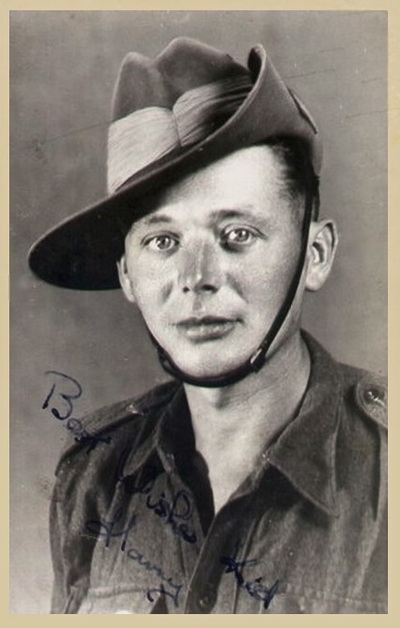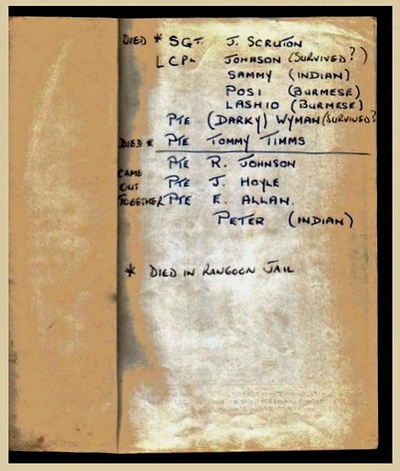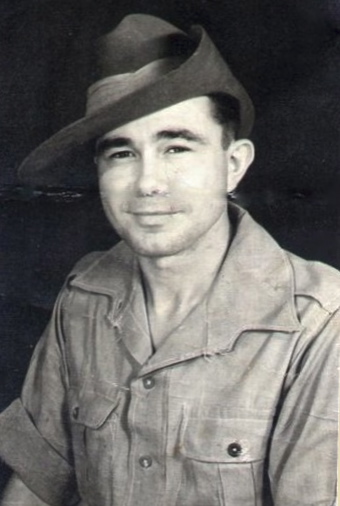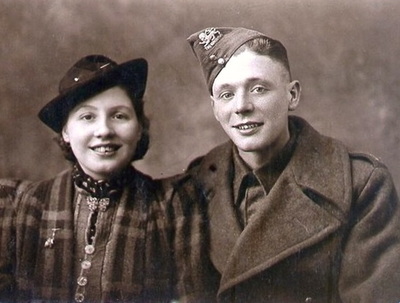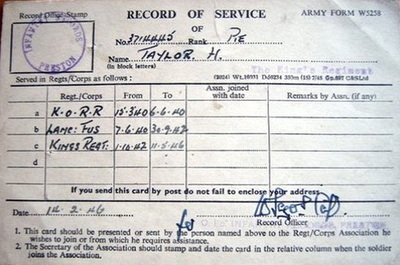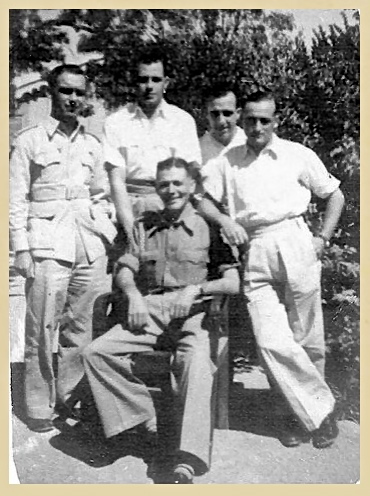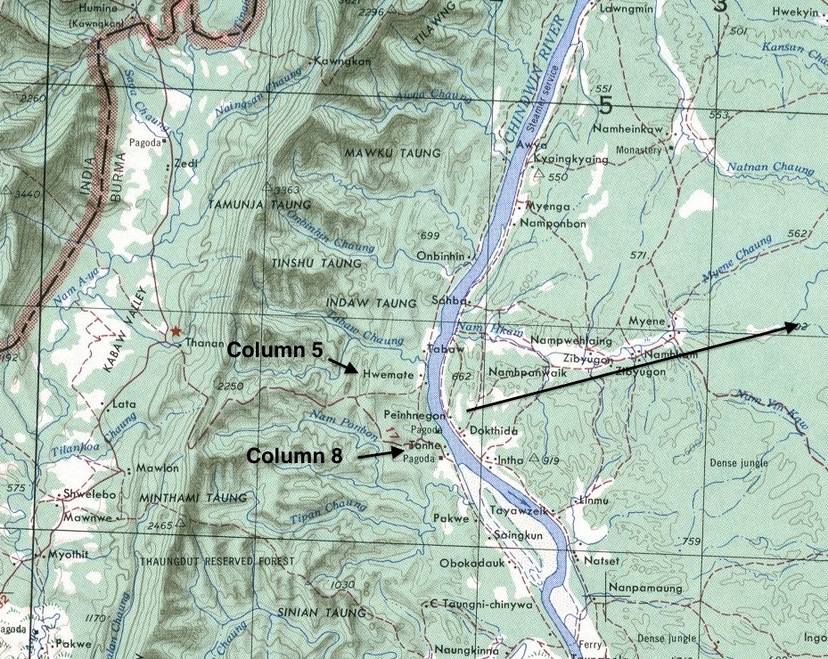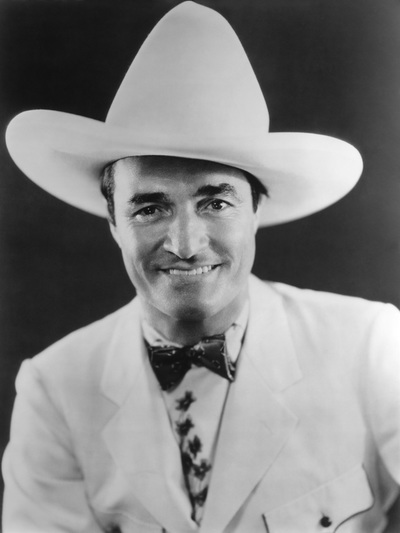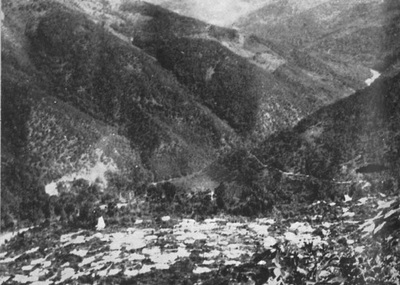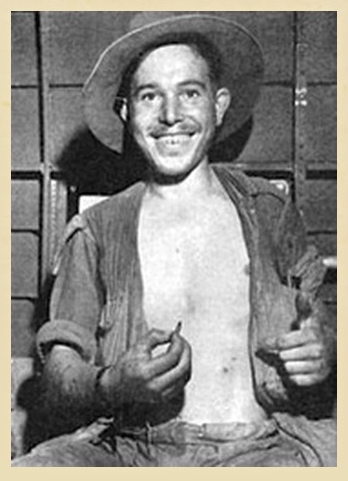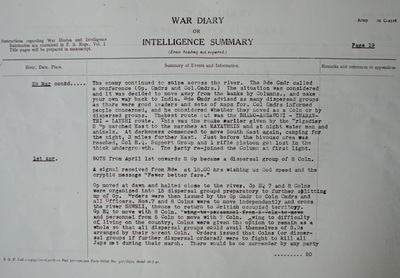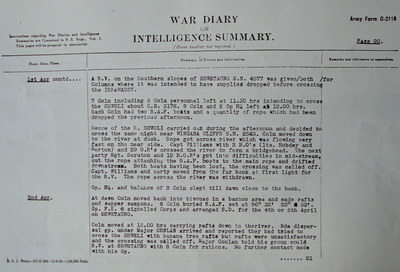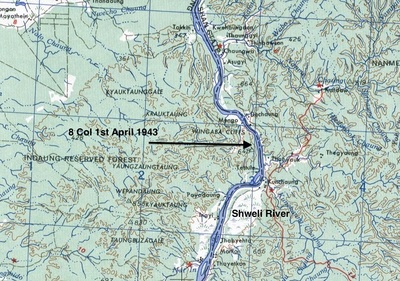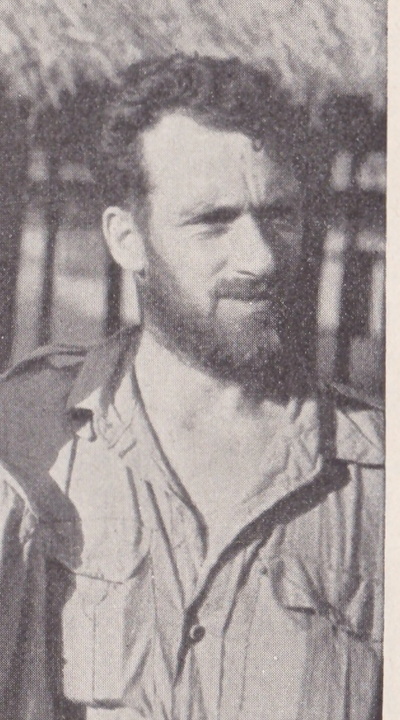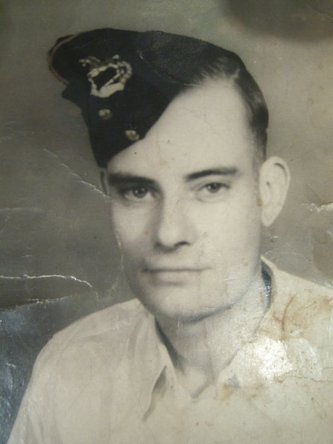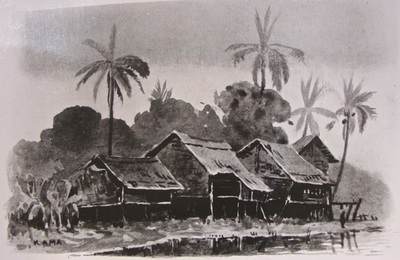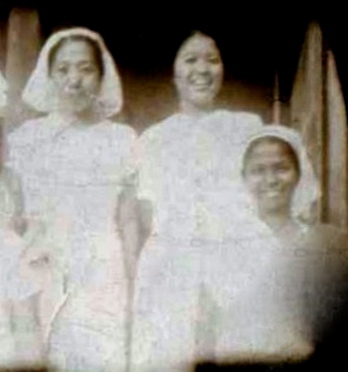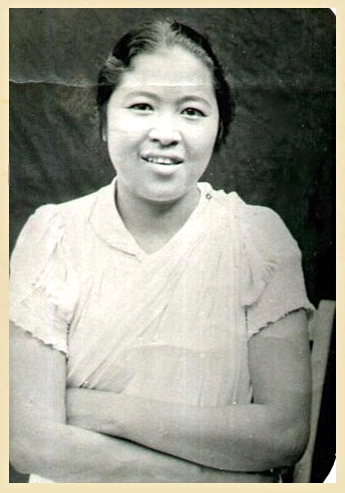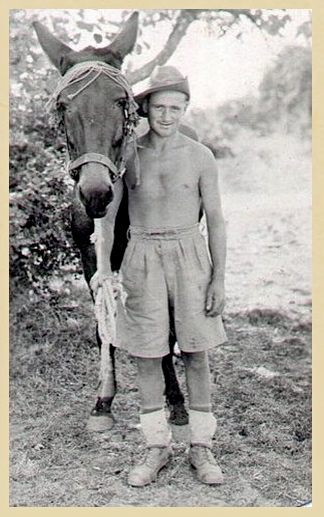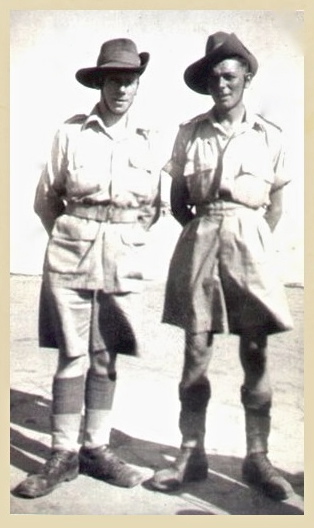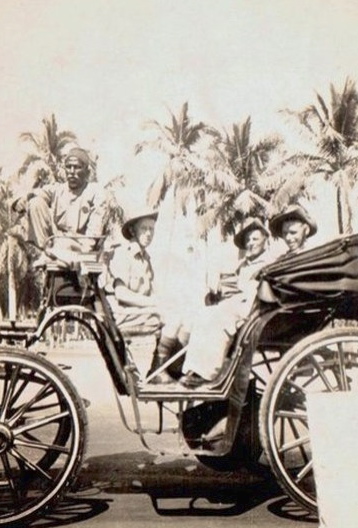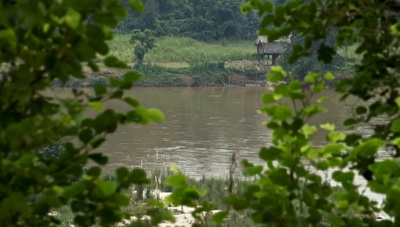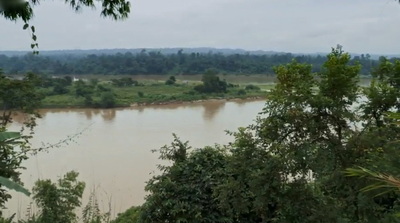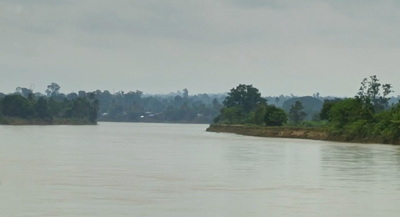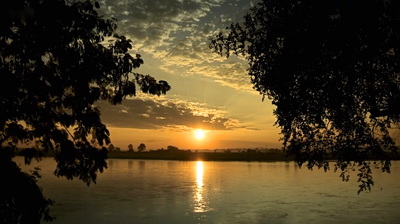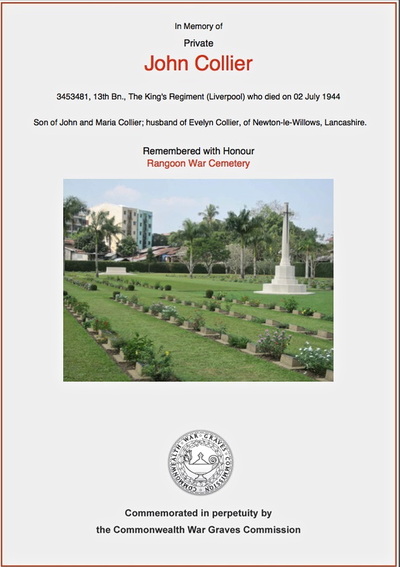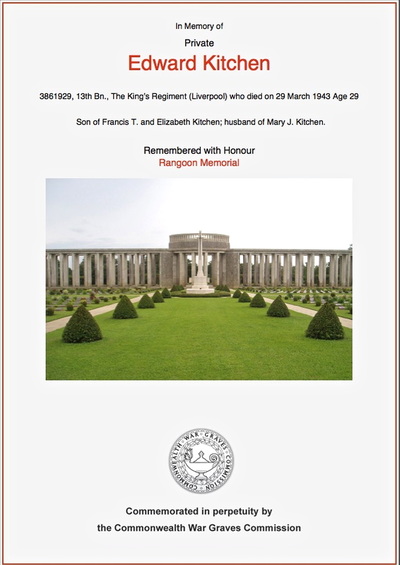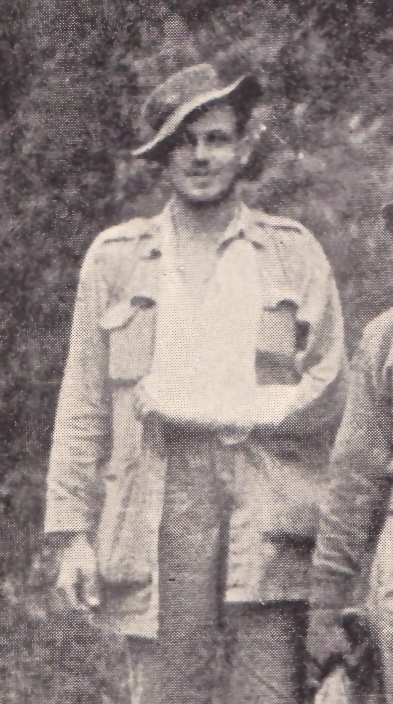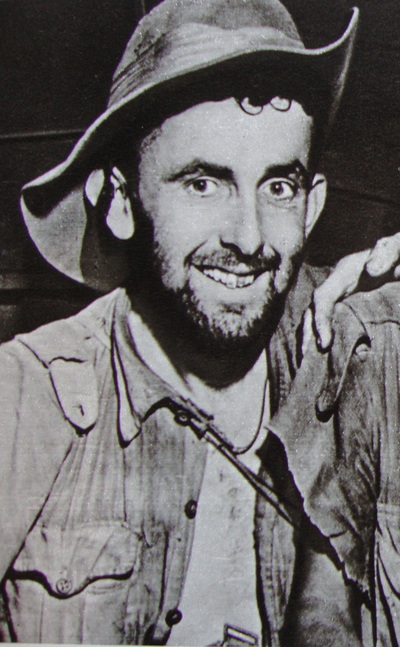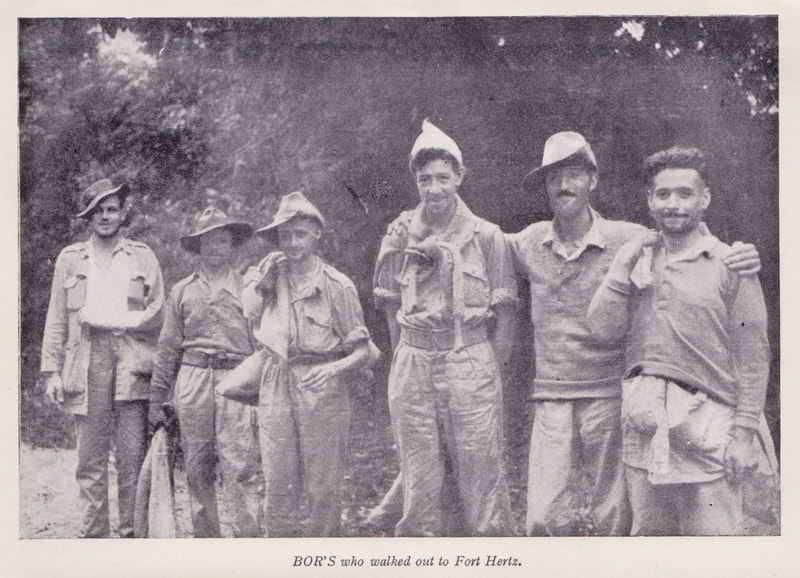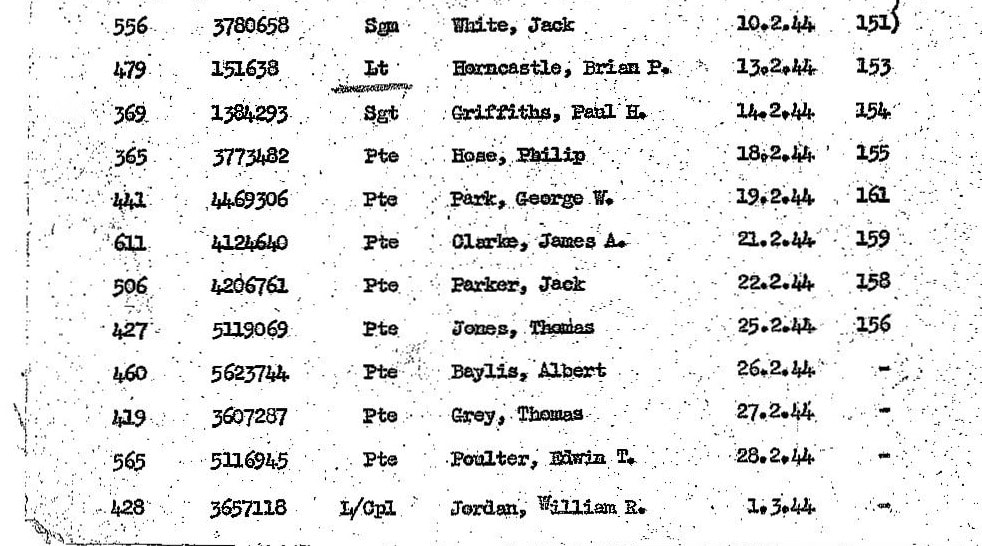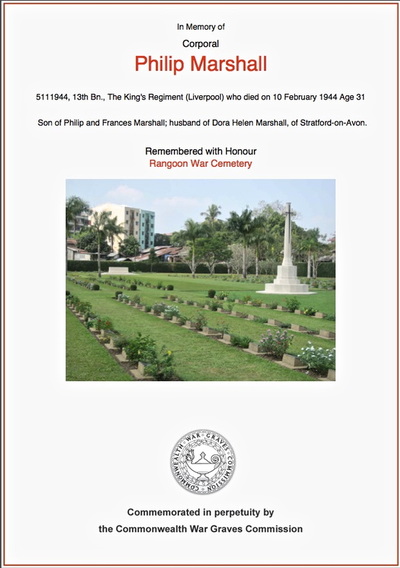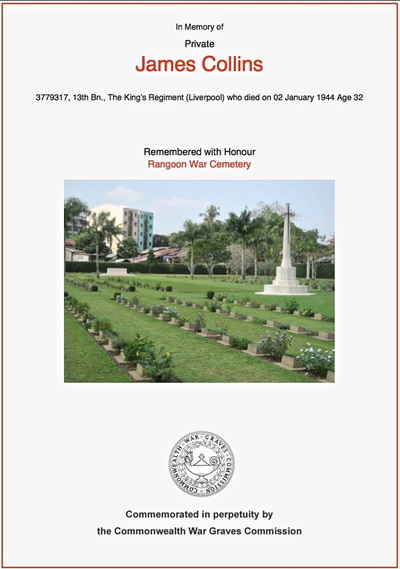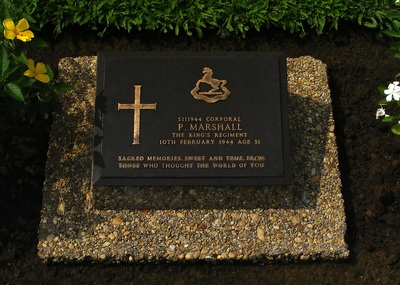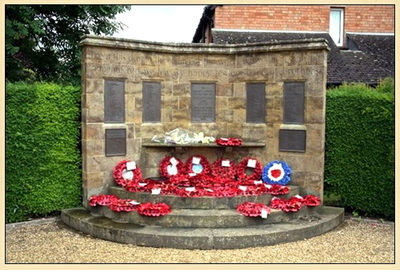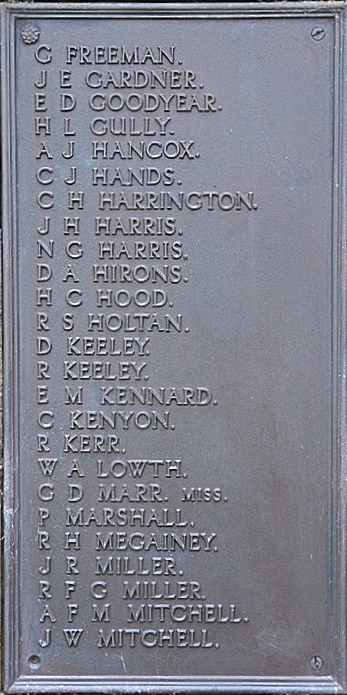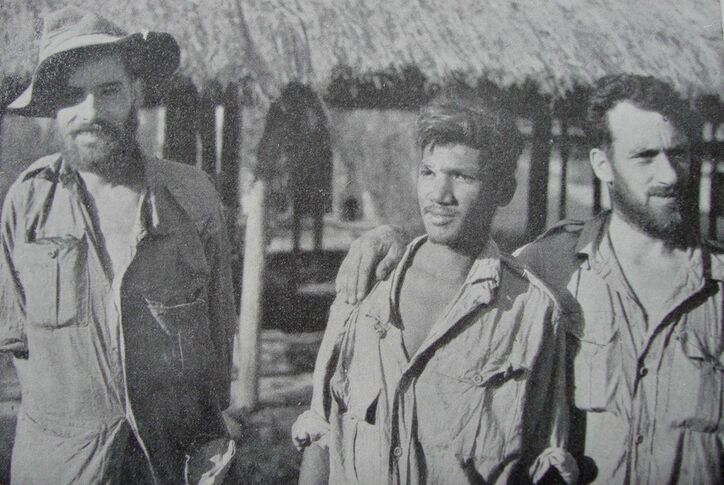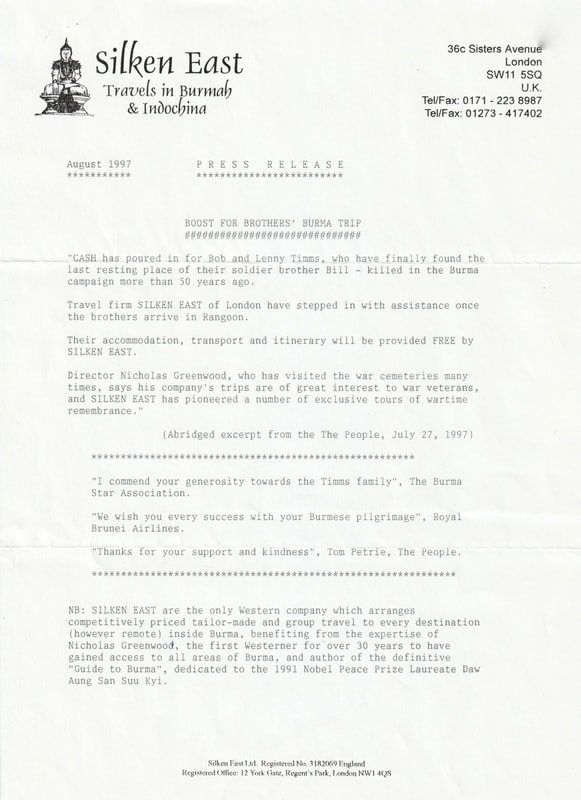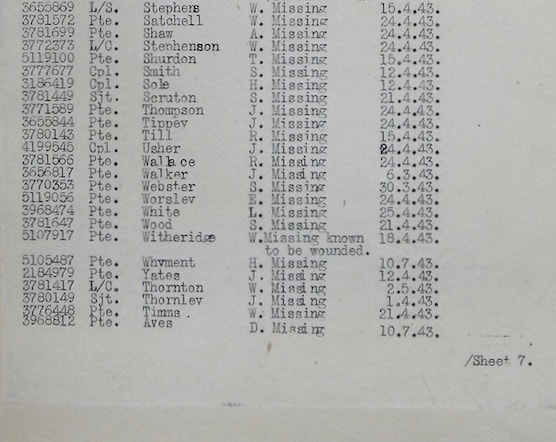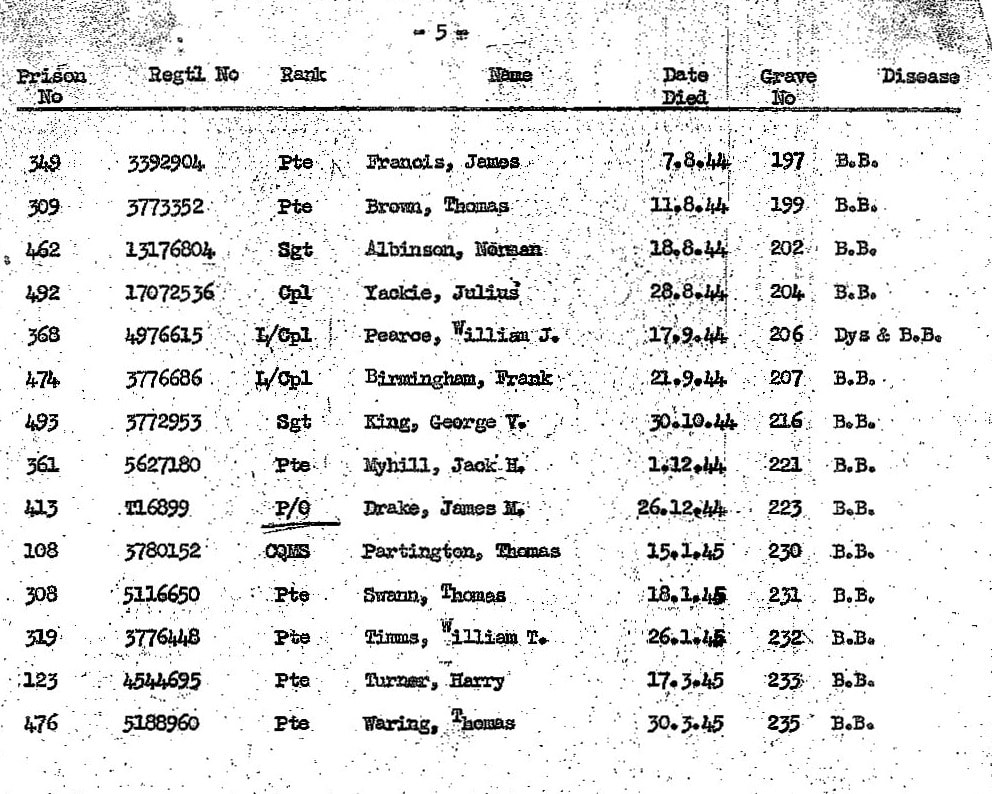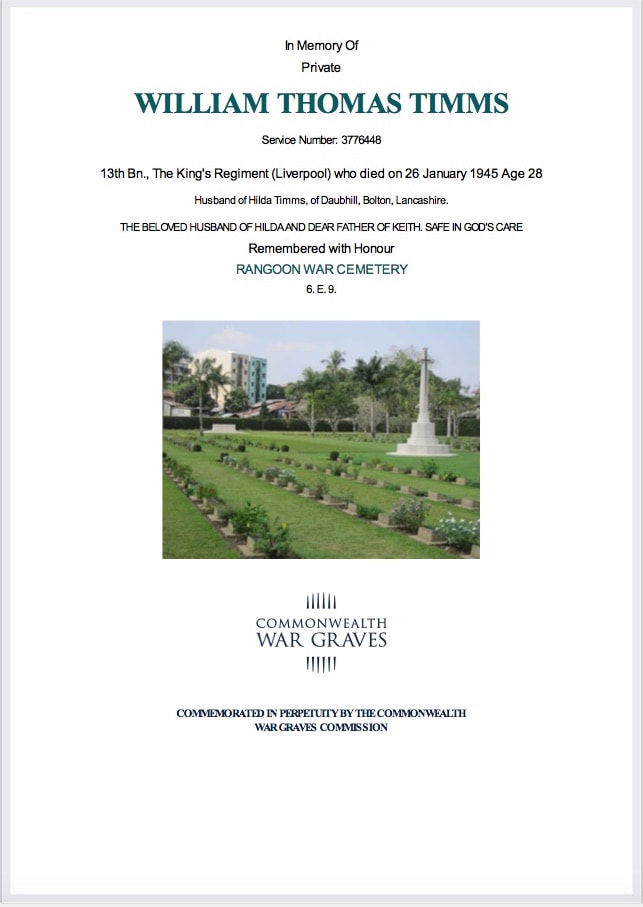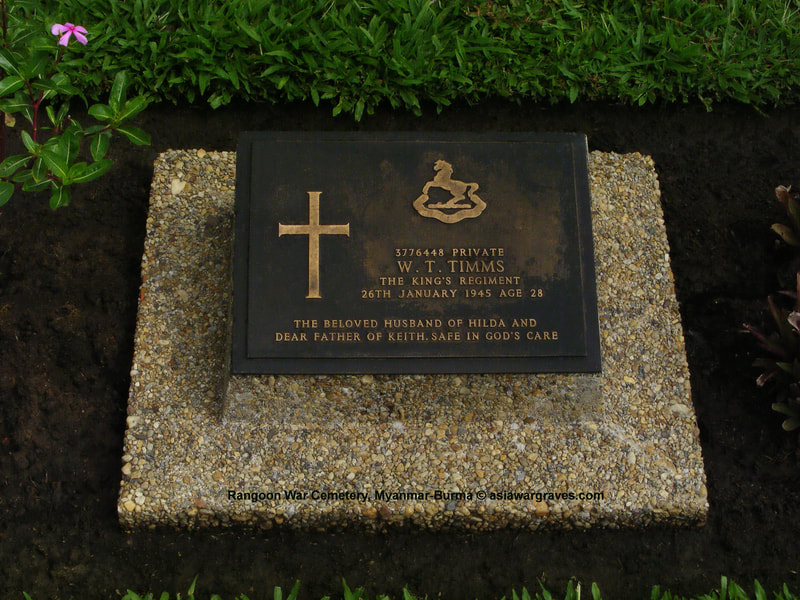Pte. Henry Taylor, a survivor from the Lost Boat on the Shweli
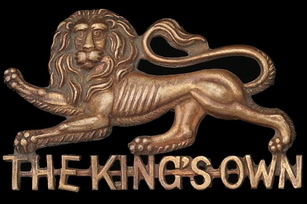 Cap badge of the King's Own Royal Regiment.
Cap badge of the King's Own Royal Regiment.
In November 2015, I received an email via my website contact page from the son of Pte. 3714445 Henry Taylor, formerly of the 13th Battalion, the King's Liverpool Regiment and a survivor of Operation Longcloth. Kim Taylor told me:
In regards to the lost boat incident on the Shweli River; my late father was one of the occupants of this boat and walked out with another four men. These were: Pte. R. Johnson, Pte. Joseph Hoyle, Pte. E. Allen and an Indian who did all the interpreting for the party named Peter. We made an audio interview with Dad around 1999. It covers the period from him being transferred from the Lancashire Fusiliers to the King's, the voyage to India, training at Saugor and all their subsequent adventures up until the Shweli crossing. He has written all the names of his party in the fly leaf of his copy of 'Wingate's Phantom Army', by W.G. Burchett.
After his enlistment into the British Army, Henry Taylor was posted to the King's Own Royal Regiment in March 1940, before being transferred to the Lancashire Fusiliers just three months later in June that same year. In the late summer of 1942, Henry was sent overseas to India, where he was once again transferred, this time to the 13th Battalion of the King's Liverpool Regiment. He spent the rest of the war with the King's Regiment, which included taking part on Operation Longcloth as part of No. 18 Platoon in Major Scott's 8 Column.
As mentioned in Kim Taylor's email, Henry was with the group of men washed away downstream, when a boat was cut loose whilst crossing the Shweli River in April 1943. This story has already featured within these website pages and can be read here: Eric Allen and the Lost Boat on the Shweli
Seen below is a photograph of Henry, known to his friends, family and from now on within these pages as 'Harry'. Also shown is the fly leaf from his copy of Wingate's Phantom Army, listing the names of the men from the boat and their fate as Harry remembered it. I was pleased to see that my educated guesswork in naming the men from the boat, which I recorded at the end of Eric Allen's story, included all of the British soldiers named by Harry on his list. It was extremely interesting to read the names of the Indian and Burmese members of the group, as soldiers from the Burma Rifles and Indian Service Corps are rarely mentioned in books or official paperwork. Please click on either image to bring forward on the page.
In regards to the lost boat incident on the Shweli River; my late father was one of the occupants of this boat and walked out with another four men. These were: Pte. R. Johnson, Pte. Joseph Hoyle, Pte. E. Allen and an Indian who did all the interpreting for the party named Peter. We made an audio interview with Dad around 1999. It covers the period from him being transferred from the Lancashire Fusiliers to the King's, the voyage to India, training at Saugor and all their subsequent adventures up until the Shweli crossing. He has written all the names of his party in the fly leaf of his copy of 'Wingate's Phantom Army', by W.G. Burchett.
After his enlistment into the British Army, Henry Taylor was posted to the King's Own Royal Regiment in March 1940, before being transferred to the Lancashire Fusiliers just three months later in June that same year. In the late summer of 1942, Henry was sent overseas to India, where he was once again transferred, this time to the 13th Battalion of the King's Liverpool Regiment. He spent the rest of the war with the King's Regiment, which included taking part on Operation Longcloth as part of No. 18 Platoon in Major Scott's 8 Column.
As mentioned in Kim Taylor's email, Henry was with the group of men washed away downstream, when a boat was cut loose whilst crossing the Shweli River in April 1943. This story has already featured within these website pages and can be read here: Eric Allen and the Lost Boat on the Shweli
Seen below is a photograph of Henry, known to his friends, family and from now on within these pages as 'Harry'. Also shown is the fly leaf from his copy of Wingate's Phantom Army, listing the names of the men from the boat and their fate as Harry remembered it. I was pleased to see that my educated guesswork in naming the men from the boat, which I recorded at the end of Eric Allen's story, included all of the British soldiers named by Harry on his list. It was extremely interesting to read the names of the Indian and Burmese members of the group, as soldiers from the Burma Rifles and Indian Service Corps are rarely mentioned in books or official paperwork. Please click on either image to bring forward on the page.
I am very grateful to Kim, for allowing me to include a transcription of his father's audio memoir as part of this story. I have made some minor changes to the script where appropriate and have added some annotated notes, which I hope will supplement the information found within Harry's narrative, otherwise, it is presented just as he described.
Update 19/01/2019
Whilst searching through the Imperial War Museum website, I was delighted to stumble upon Harry Taylor's audio memoir which is the basis for the narrative below. If you would like to listen to the audio then simply click on the link below:
www.iwm.org.uk/collections/item/object/80027143
The WW2 Diary of Pte. Harry Taylor
We were up near Hull at Hornsea, a little seaside place and we were billeted in a schoolroom when they first started taking drafts; Harold Hall was on one of the first ones to leave and I volunteered to go with him because we’d been mates for such a long time, but they wouldn’t let me go with being the company barber and they kept me till the last. I was on one of the last drafts to come from Hornsea and we went to Liverpool, the Formby Barracks, I always remember there were guards on the gates so we couldn’t get out and everybody was confined to barrack’s.
I think it was Thursday or Friday afternoon and we were all waiting to join the convoy to go abroad. Not being so far from Preston, I thought, well if I can get out for a couple of days, they wouldn’t have let me go out officially, so I thought well I’ll try and get out on my own. I always remember it was Sunday morning and there was what looked like to me an oldish bloke, he’d only be about forty, an old soldier dishing slices of bread out, and after I’d had my breakfast he came round clearing tables, so I said, “can you tell me if there’s a way out?” He said “what for” and I said, “well I want to get home” and he said, “wait while I’ve finished and I’ll be over in that corner waiting for you.”
So that’s what happened, he took me outside and there was a built in thing like a shelter, full of timber and at the back of this timber there was a stone wall about fifteen foot high. He said, “if you can climb up there and down the other side, then there’s a row of houses and they’ve been bombed and there all empty, walk along the alleyway and you’ll find there’s an entrance onto the main road and from there happen you’ll get a bus or thumb a lift, and don’t forget I haven’t told you. If you’re coming back you’ll have to come that way too because the gates are locked.”
So I climbed up this wall and down the other side, and made my way to the main road like he said and put my thumb up because there were a van coming, a little navy blue van and they always stopped in them days for anybody in uniform and it were a milk fella, he said “were do you want to go,” I said, Preston and he said “I’m not going there but I can take you as far as the Golden Ball at Longton.” I said, “that’ll do me, from Longton I’ll get another lift,” so that’s were he dropped me off and I got a lift off another bloke and he dropped me off at the bottom of Fishergate Hill.
So when I reached home Mummy said, “how long have you got” and I said, “well two or three days” and I think it was Thursday when I set off back. I didn’t go to the bus station; I caught the bus at the bottom of Fishergate Hill because the Railway station and Bus station were always full of Redcaps[1].
I got on this Liverpool bus and it was a woman conductor and I said, “I want Formby Barracks but I don’t know where to get off.” She said, “Oh do you,” I think see twigged it that I was on the run. She said, “well when the bus gets there I’ll come and tell you,” I was giving her the money and she winked at me and gave me a ticket and I thought “what a kind soul.”
So, where she dropped me off, it was only five minutes walk and I was back in the bombed houses. I got over the wall and down the other side and there was nobody knocking about, I thought, “where the hell have they all gone”. I’d only been there from the week before and I couldn’t find anything I recognised, every hut looked like another and I didn’t know which one I was in, all the huts were empty, no kit and nobody in them at all.
I’d looked in two or three more huts and I came out of one and saw an officer coming up. He said, “and what do you want,” I said, “I’m looking for such and such a platoon.” He said “Oh, I think your one of this group, you’d better go to the guard room, there’s twenty odd of you there.”
So I went to the guardroom and there they were, and I made the number up to twenty-three. That’s where I met Bill Davis, the one who was wounded in the arm[2].
The morning after, a coach came and there was a Brigadier there, a little fat fella getting on in years and two MPs and only one way on and one way off, no back door or anything like that. They formed the twenty three of us up and stood us to attention and the Brigadier said, “lets see, you’ve been away three days I know that” he said, “did you enjoy it.” Well nobody moved did they and he said, “I’ll ask you again, answer me, did you enjoy it?” And they all said “aye” then he said, “look, think yourselves lucky, your going to get away with it, we aren’t charging you because the convoy is forming up now and the boat your going on is still in dock, now get on that bloody bus and don’t get any more fresh ideas and good luck to you.”
So off we go on the coach with the two Redcaps on the door so nobody could get off, down to, I think it was Albert Dock but I’m not sure. As we were going on board they gave us a ticket with a cabin number on it with four to a cabin, when we got in it was lovely, four bunks, a porthole and nice, thick white fluffy blankets. I think we’d been on board about two days when a Sergeant came and said, “what lot are you in” and I said he Lancashire Fusiliers. He said, “pack away your gear, don’t leave anything behind and go down to C Deck, they’ll show you were to go from there."
So, we all went out and the blokes who were taking over from us were stood there waiting and guess what Regiment they were in, the bloody Pay Corps and as we marched out they marched in and took our beds off us, we ended up in hammocks, and when I say hammocks there was about a foot of space between each one and not only hammocks, some slept on the floor and some slept on the dining room tables which were about twelve foot long, so you could get two on top.
When we got to the tropical climate it was too warm, so I slept on deck near the steam winches, but there was a bit of a snag, because at four in the morning they came round and hosed the decks down, I suppose it was to stop the timbers from shrinking. They didn’t warn you, they probably thought, “if we give them a good soaking they won’t come again.”
The toilets were up on deck for everyone, they were cabins. It was dark when you walked in there, with no lights, they were forbidden; inside there was a line of toilets down one wall and showers down the other. When you had a shower you pulled a chain and as the water came out it was phosphorescent and lit everything up with a green light and when you looked out to sea all the tips of the waves were green. About two days out if I remember it right, one of the cooks died. The ship sailed a zigzag course which you could follow on a map, but only the previous days progress. The first port we called at was Freetown[3] to take on water and fresh fruit and vegetables and the local youngsters, some as young as four or five would dive for pennies, they’d come up with them in their teeth to show you.
[1] The soldiers nickname for the British Military Police.
[2] Harry is referring to Pte. William Davis from Croston near Preston, who was wounded in the arm whilst with 8 Column in Burma.
[3] This was Freetown, Sierra Leone, very often the first stop on a voyage to the Far East. Here the troopships would re-stock with fresh supplies, but no shore leave was permitted for the men.
Seen below are some photographs in relation to the first part of Harry Taylor's story. Please click on any image to bring it forward on the page.
Update 19/01/2019
Whilst searching through the Imperial War Museum website, I was delighted to stumble upon Harry Taylor's audio memoir which is the basis for the narrative below. If you would like to listen to the audio then simply click on the link below:
www.iwm.org.uk/collections/item/object/80027143
The WW2 Diary of Pte. Harry Taylor
We were up near Hull at Hornsea, a little seaside place and we were billeted in a schoolroom when they first started taking drafts; Harold Hall was on one of the first ones to leave and I volunteered to go with him because we’d been mates for such a long time, but they wouldn’t let me go with being the company barber and they kept me till the last. I was on one of the last drafts to come from Hornsea and we went to Liverpool, the Formby Barracks, I always remember there were guards on the gates so we couldn’t get out and everybody was confined to barrack’s.
I think it was Thursday or Friday afternoon and we were all waiting to join the convoy to go abroad. Not being so far from Preston, I thought, well if I can get out for a couple of days, they wouldn’t have let me go out officially, so I thought well I’ll try and get out on my own. I always remember it was Sunday morning and there was what looked like to me an oldish bloke, he’d only be about forty, an old soldier dishing slices of bread out, and after I’d had my breakfast he came round clearing tables, so I said, “can you tell me if there’s a way out?” He said “what for” and I said, “well I want to get home” and he said, “wait while I’ve finished and I’ll be over in that corner waiting for you.”
So that’s what happened, he took me outside and there was a built in thing like a shelter, full of timber and at the back of this timber there was a stone wall about fifteen foot high. He said, “if you can climb up there and down the other side, then there’s a row of houses and they’ve been bombed and there all empty, walk along the alleyway and you’ll find there’s an entrance onto the main road and from there happen you’ll get a bus or thumb a lift, and don’t forget I haven’t told you. If you’re coming back you’ll have to come that way too because the gates are locked.”
So I climbed up this wall and down the other side, and made my way to the main road like he said and put my thumb up because there were a van coming, a little navy blue van and they always stopped in them days for anybody in uniform and it were a milk fella, he said “were do you want to go,” I said, Preston and he said “I’m not going there but I can take you as far as the Golden Ball at Longton.” I said, “that’ll do me, from Longton I’ll get another lift,” so that’s were he dropped me off and I got a lift off another bloke and he dropped me off at the bottom of Fishergate Hill.
So when I reached home Mummy said, “how long have you got” and I said, “well two or three days” and I think it was Thursday when I set off back. I didn’t go to the bus station; I caught the bus at the bottom of Fishergate Hill because the Railway station and Bus station were always full of Redcaps[1].
I got on this Liverpool bus and it was a woman conductor and I said, “I want Formby Barracks but I don’t know where to get off.” She said, “Oh do you,” I think see twigged it that I was on the run. She said, “well when the bus gets there I’ll come and tell you,” I was giving her the money and she winked at me and gave me a ticket and I thought “what a kind soul.”
So, where she dropped me off, it was only five minutes walk and I was back in the bombed houses. I got over the wall and down the other side and there was nobody knocking about, I thought, “where the hell have they all gone”. I’d only been there from the week before and I couldn’t find anything I recognised, every hut looked like another and I didn’t know which one I was in, all the huts were empty, no kit and nobody in them at all.
I’d looked in two or three more huts and I came out of one and saw an officer coming up. He said, “and what do you want,” I said, “I’m looking for such and such a platoon.” He said “Oh, I think your one of this group, you’d better go to the guard room, there’s twenty odd of you there.”
So I went to the guardroom and there they were, and I made the number up to twenty-three. That’s where I met Bill Davis, the one who was wounded in the arm[2].
The morning after, a coach came and there was a Brigadier there, a little fat fella getting on in years and two MPs and only one way on and one way off, no back door or anything like that. They formed the twenty three of us up and stood us to attention and the Brigadier said, “lets see, you’ve been away three days I know that” he said, “did you enjoy it.” Well nobody moved did they and he said, “I’ll ask you again, answer me, did you enjoy it?” And they all said “aye” then he said, “look, think yourselves lucky, your going to get away with it, we aren’t charging you because the convoy is forming up now and the boat your going on is still in dock, now get on that bloody bus and don’t get any more fresh ideas and good luck to you.”
So off we go on the coach with the two Redcaps on the door so nobody could get off, down to, I think it was Albert Dock but I’m not sure. As we were going on board they gave us a ticket with a cabin number on it with four to a cabin, when we got in it was lovely, four bunks, a porthole and nice, thick white fluffy blankets. I think we’d been on board about two days when a Sergeant came and said, “what lot are you in” and I said he Lancashire Fusiliers. He said, “pack away your gear, don’t leave anything behind and go down to C Deck, they’ll show you were to go from there."
So, we all went out and the blokes who were taking over from us were stood there waiting and guess what Regiment they were in, the bloody Pay Corps and as we marched out they marched in and took our beds off us, we ended up in hammocks, and when I say hammocks there was about a foot of space between each one and not only hammocks, some slept on the floor and some slept on the dining room tables which were about twelve foot long, so you could get two on top.
When we got to the tropical climate it was too warm, so I slept on deck near the steam winches, but there was a bit of a snag, because at four in the morning they came round and hosed the decks down, I suppose it was to stop the timbers from shrinking. They didn’t warn you, they probably thought, “if we give them a good soaking they won’t come again.”
The toilets were up on deck for everyone, they were cabins. It was dark when you walked in there, with no lights, they were forbidden; inside there was a line of toilets down one wall and showers down the other. When you had a shower you pulled a chain and as the water came out it was phosphorescent and lit everything up with a green light and when you looked out to sea all the tips of the waves were green. About two days out if I remember it right, one of the cooks died. The ship sailed a zigzag course which you could follow on a map, but only the previous days progress. The first port we called at was Freetown[3] to take on water and fresh fruit and vegetables and the local youngsters, some as young as four or five would dive for pennies, they’d come up with them in their teeth to show you.
[1] The soldiers nickname for the British Military Police.
[2] Harry is referring to Pte. William Davis from Croston near Preston, who was wounded in the arm whilst with 8 Column in Burma.
[3] This was Freetown, Sierra Leone, very often the first stop on a voyage to the Far East. Here the troopships would re-stock with fresh supplies, but no shore leave was permitted for the men.
Seen below are some photographs in relation to the first part of Harry Taylor's story. Please click on any image to bring it forward on the page.
Harry continues with his diary:
I think we were only there (Freetown) one day before we sailed for Cape Town[1], now that was well organised; the day after we docked, there were coaches and private cars to pick us up and run us about, they took us up Table Mountain and we went to the Beach Hotel, which was all laid out with tables full of stuff which was rationed at home, so we all had a right good feast.
Then the bar opened for a free half-hour, well some of them but not me, were on the short stuff weren’t they and had a right good time. Anyhow after about three or four days we left Cape Town and we hadn’t been at sea very long when a terrible storm came on, we daren’t go on deck for about three days, one chap was scalded badly when going down a ladder with a bucket of tea. Then we docked at Bombay and we were straight off and on a train down to Deolali[2] and I think we were there about a couple of weeks. There were no parades or anything, I think they were letting us get acclimatised, we were just eating and lying down, I think we stayed there about two weeks and then we went back on the train to Bombay and from Bombay to Saugor in the Central Provinces.
We got off the train and a bloke met us on a charger, it was night-time, we didn’t know where we were going and after a forced march with dust flying everywhere we came to Saugor village. Now Saugor village wasn’t a big place, but there was a cinema there and we used to go the few days we were at Saugor and they were all cowboy pictures, nowt but cowboys, Tom Mix and that lot. I cant remember how long we stayed there before we marched off into the jungle and that’s when our training started which mainly consisted of map and compass use, moving silently and mostly forced marches to harden us up, we hadn’t got mules then so it was mostly marching.
It was while we were at Saugor[3] and coming back after a march, that the Sergeant Major got down on one knee and fired and killed a deer as big as a mule, it took four blokes to carry it, they didn’t get back to camp until the next day, he wasn’t very popular. The grub we got was mostly deer or goat meat, but whatever we got there were always onions with it, apparently Wingate loved his onions, he always had some with him I think he thought they kept disease away, whether it did or not I don’t know. For breakfast it was always porridge, I know it wasn’t egg and bacon, I didn’t put any weight on, I was still my usual just over nine stone.
From Saugor we went to a place called Jhansi[4] where we were under canvas and we were finishing training and that’s when the mules came, it must have been December just coming up to Christmas. We went down to the railway station to get these mules and it was just like a rodeo with their back legs flying all over the place, we had a terrible day. Now with mules, even when they’d quietened down you could never trust them, you’d be walking along and they’d try and sit down. I had one I called Mollie for about a month, I’d unloaded it and put a halter on it and as I turned round it must have smelt water because it shot off and I had to let the halter go because it was burning my hand, when I finally caught it up, it was stood there having a drink.
The chargers were lovely horses, the officers used them for going to meetings, but they didn’t last as long as the mules. One day (whilst in Burma) I was following Bill Satchell[5] who was a groom and was leading one which was getting over a tree trunk when it gave a groan and dropped dead. At the beginning of the day it took about five of us to get the load on and when you were loading a mule you always got the girth strap, pulled it tight and brought your knee up into its stomach and then, as they gasped for breath got an extra couple of holes, then the load wouldn’t slip round.
I remember on one supply drop, I went out to collect some stuff and after the third trip I turned round and the rest had gone into the jungle and I was alone when the saddle slipped round and I weren’t half in it. Lucky for me Mollie was pretty quiet by now and just stood there and didn’t try to run away, so I’d no trouble with it, but I couldn’t get the load back up on my own. As I’m trying, a Ghurka came up, his mule was loaded up and he could see what had happened so he helped me take the load off, put the saddle back on and load up again. He couldn’t speak English, but he beckoned me to follow him, and by this time it was going dark and we’d no idea were the rest had gone.
We used to tie a piece of parachute cloth to the mule’s tail so you could see it bobbing up and down in the dark. So I’m following this thing and I don’t know how he knew where he were going, whether he could smell them or not, but we walked for a long, long way and eventually caught up with the column. By this time they’d stopped and were bedding down for the night and the Sergeant said, unload the mules, get down and get some sleep and pointed to a bit of a clearing. Anyway I tied the mule up and got down, I used to sleep with my head under the saddle and it wasn’t long before it was coming light again and as I woke and looked about I could see some skeletons around me. There must have been fourteen or fifteen altogether, one was sat up against a tree had a bullet hole through the forehead, they’d all been shot, quite a few of the lads came to look at them, we thought they might have been evacuees fleeing from the Japs the year before.
Picking loads up on a supply drop, you had to be quick and get back in because you were always out in the open. What they used to do for these drops was light four bonfires in a box formation and as the planes came over they’d see the smoke and come in once to make sure everything was ok, then come round again and make the first drop which was ammunition with red parachutes; rations were always the last. When you got your rations, which were for ten days of course, not knowing when you were going to get the next lot you made them last longer than ten days.
It was at Jhansi we got our new equipment, the best thing was a frame with a pack they were called Everest frames. You could put your big pack on it and your small one as well, on the side your water bottle and your Dah[6], the frame kept it all off your back by a couple of inches so the air could circulate. They were really comfortable to have on, especially as you were carrying all that weight[7], and when you sat down it was grand, we just undid the belt buckle and it was just like sitting in a chair, there were also a couple of loops to put your thumbs in.
The boots were standard Army boots, but we were also issued with what they called patrol boots, which were like a suede material, they came up the calf about eight inches and had a rubber pad on the ankle bone. They were comfortable, but not for long walks as the heels were pretty flat, we just used them for going out on patrol. We also had lovely white woollen socks; I think all these things were made in Australia. We had Bush hats with a mosquito net attached to the brim and tied around the neck, but not many used them, as it was too hard to breathe with the heat. I didn’t wear mine at all.
We had canvas water wings as well, which we wet before blowing them up it was supposed to seal them. The canvas water bottles were the same, wet before they were filled and hooked onto the mule because they dripped all the time. Everybody had a six-foot toggle rope[8], which had a loop at one end and a peg at the other, so we could be looped together to make a long rope if we needed one; they were also knotted about every foot.
We had a dah, a jacknife and escape money, I cant remember whether it was twenty or twenty five silver rupees; sixty rounds of ammunition, a couple of grenades, Bren magazines and ten days rations. These consisted of milk powder, dates, nuts, acid drops to keep your mouth moist, big square biscuits, tea, and sugar lumps. I can’t remember anything else. I know there was no bully beef and we were always hungry, we never got a square meal.
Early on in the expedition we used to line up in the morning and the officer used to shout “come and get your eggs and bacon,” it was a little tablet and we got more out of that tablet than the rations, we always felt better after we had taken it.
The time came at Jhansi for us to move off to Burma and everything went on the train, we went straight across India to the north east and after that we were on a narrow gauge railway for a couple of days and that was the end of our riding, it was on foot all the way from then on. We were marching towards Imphal and went through a little state called Manipur and I remember the natives building roads and they all had brass armlets on they looked like proper tribesmen, through the Naga Hills and down to Imphal, I think it took us around six days but might have been a bit longer.
[1] Most convoys transporting troops to the Far East, stopped over at either Cape Town or Durban, this usually involved a period of shore leave for the men.
[2] Deolali was a large British Reinforcement Centre located just northeast of Bombay. Most, if not all British soldiers passed through the cantonment at one point or other during their stay on the sub-continent.
[3] Harry Taylor and the draft of Lancashire Fusiliers arrived at the Saugor Camp on 30th September 1942.
[4] Jhansi was a large railway intersection town. 77th Brigade held it’s final large-scale training exercise at Jhansi, just before Christmas 1942.
[5] 3781572 Pte. William Satchell. Killed in action on the 24th April 1943 whilst attempting to cross the Irrawaddy River on a makeshift raft.
[6] A Dah was a large machete styled knife.
[7] A typical Chindit pack with a full compliment of rations could weigh as much as 70lbs.
[8] For convenience and easy access, soldiers used to wrap this toggle rope around their Bush hat.
I think we were only there (Freetown) one day before we sailed for Cape Town[1], now that was well organised; the day after we docked, there were coaches and private cars to pick us up and run us about, they took us up Table Mountain and we went to the Beach Hotel, which was all laid out with tables full of stuff which was rationed at home, so we all had a right good feast.
Then the bar opened for a free half-hour, well some of them but not me, were on the short stuff weren’t they and had a right good time. Anyhow after about three or four days we left Cape Town and we hadn’t been at sea very long when a terrible storm came on, we daren’t go on deck for about three days, one chap was scalded badly when going down a ladder with a bucket of tea. Then we docked at Bombay and we were straight off and on a train down to Deolali[2] and I think we were there about a couple of weeks. There were no parades or anything, I think they were letting us get acclimatised, we were just eating and lying down, I think we stayed there about two weeks and then we went back on the train to Bombay and from Bombay to Saugor in the Central Provinces.
We got off the train and a bloke met us on a charger, it was night-time, we didn’t know where we were going and after a forced march with dust flying everywhere we came to Saugor village. Now Saugor village wasn’t a big place, but there was a cinema there and we used to go the few days we were at Saugor and they were all cowboy pictures, nowt but cowboys, Tom Mix and that lot. I cant remember how long we stayed there before we marched off into the jungle and that’s when our training started which mainly consisted of map and compass use, moving silently and mostly forced marches to harden us up, we hadn’t got mules then so it was mostly marching.
It was while we were at Saugor[3] and coming back after a march, that the Sergeant Major got down on one knee and fired and killed a deer as big as a mule, it took four blokes to carry it, they didn’t get back to camp until the next day, he wasn’t very popular. The grub we got was mostly deer or goat meat, but whatever we got there were always onions with it, apparently Wingate loved his onions, he always had some with him I think he thought they kept disease away, whether it did or not I don’t know. For breakfast it was always porridge, I know it wasn’t egg and bacon, I didn’t put any weight on, I was still my usual just over nine stone.
From Saugor we went to a place called Jhansi[4] where we were under canvas and we were finishing training and that’s when the mules came, it must have been December just coming up to Christmas. We went down to the railway station to get these mules and it was just like a rodeo with their back legs flying all over the place, we had a terrible day. Now with mules, even when they’d quietened down you could never trust them, you’d be walking along and they’d try and sit down. I had one I called Mollie for about a month, I’d unloaded it and put a halter on it and as I turned round it must have smelt water because it shot off and I had to let the halter go because it was burning my hand, when I finally caught it up, it was stood there having a drink.
The chargers were lovely horses, the officers used them for going to meetings, but they didn’t last as long as the mules. One day (whilst in Burma) I was following Bill Satchell[5] who was a groom and was leading one which was getting over a tree trunk when it gave a groan and dropped dead. At the beginning of the day it took about five of us to get the load on and when you were loading a mule you always got the girth strap, pulled it tight and brought your knee up into its stomach and then, as they gasped for breath got an extra couple of holes, then the load wouldn’t slip round.
I remember on one supply drop, I went out to collect some stuff and after the third trip I turned round and the rest had gone into the jungle and I was alone when the saddle slipped round and I weren’t half in it. Lucky for me Mollie was pretty quiet by now and just stood there and didn’t try to run away, so I’d no trouble with it, but I couldn’t get the load back up on my own. As I’m trying, a Ghurka came up, his mule was loaded up and he could see what had happened so he helped me take the load off, put the saddle back on and load up again. He couldn’t speak English, but he beckoned me to follow him, and by this time it was going dark and we’d no idea were the rest had gone.
We used to tie a piece of parachute cloth to the mule’s tail so you could see it bobbing up and down in the dark. So I’m following this thing and I don’t know how he knew where he were going, whether he could smell them or not, but we walked for a long, long way and eventually caught up with the column. By this time they’d stopped and were bedding down for the night and the Sergeant said, unload the mules, get down and get some sleep and pointed to a bit of a clearing. Anyway I tied the mule up and got down, I used to sleep with my head under the saddle and it wasn’t long before it was coming light again and as I woke and looked about I could see some skeletons around me. There must have been fourteen or fifteen altogether, one was sat up against a tree had a bullet hole through the forehead, they’d all been shot, quite a few of the lads came to look at them, we thought they might have been evacuees fleeing from the Japs the year before.
Picking loads up on a supply drop, you had to be quick and get back in because you were always out in the open. What they used to do for these drops was light four bonfires in a box formation and as the planes came over they’d see the smoke and come in once to make sure everything was ok, then come round again and make the first drop which was ammunition with red parachutes; rations were always the last. When you got your rations, which were for ten days of course, not knowing when you were going to get the next lot you made them last longer than ten days.
It was at Jhansi we got our new equipment, the best thing was a frame with a pack they were called Everest frames. You could put your big pack on it and your small one as well, on the side your water bottle and your Dah[6], the frame kept it all off your back by a couple of inches so the air could circulate. They were really comfortable to have on, especially as you were carrying all that weight[7], and when you sat down it was grand, we just undid the belt buckle and it was just like sitting in a chair, there were also a couple of loops to put your thumbs in.
The boots were standard Army boots, but we were also issued with what they called patrol boots, which were like a suede material, they came up the calf about eight inches and had a rubber pad on the ankle bone. They were comfortable, but not for long walks as the heels were pretty flat, we just used them for going out on patrol. We also had lovely white woollen socks; I think all these things were made in Australia. We had Bush hats with a mosquito net attached to the brim and tied around the neck, but not many used them, as it was too hard to breathe with the heat. I didn’t wear mine at all.
We had canvas water wings as well, which we wet before blowing them up it was supposed to seal them. The canvas water bottles were the same, wet before they were filled and hooked onto the mule because they dripped all the time. Everybody had a six-foot toggle rope[8], which had a loop at one end and a peg at the other, so we could be looped together to make a long rope if we needed one; they were also knotted about every foot.
We had a dah, a jacknife and escape money, I cant remember whether it was twenty or twenty five silver rupees; sixty rounds of ammunition, a couple of grenades, Bren magazines and ten days rations. These consisted of milk powder, dates, nuts, acid drops to keep your mouth moist, big square biscuits, tea, and sugar lumps. I can’t remember anything else. I know there was no bully beef and we were always hungry, we never got a square meal.
Early on in the expedition we used to line up in the morning and the officer used to shout “come and get your eggs and bacon,” it was a little tablet and we got more out of that tablet than the rations, we always felt better after we had taken it.
The time came at Jhansi for us to move off to Burma and everything went on the train, we went straight across India to the north east and after that we were on a narrow gauge railway for a couple of days and that was the end of our riding, it was on foot all the way from then on. We were marching towards Imphal and went through a little state called Manipur and I remember the natives building roads and they all had brass armlets on they looked like proper tribesmen, through the Naga Hills and down to Imphal, I think it took us around six days but might have been a bit longer.
[1] Most convoys transporting troops to the Far East, stopped over at either Cape Town or Durban, this usually involved a period of shore leave for the men.
[2] Deolali was a large British Reinforcement Centre located just northeast of Bombay. Most, if not all British soldiers passed through the cantonment at one point or other during their stay on the sub-continent.
[3] Harry Taylor and the draft of Lancashire Fusiliers arrived at the Saugor Camp on 30th September 1942.
[4] Jhansi was a large railway intersection town. 77th Brigade held it’s final large-scale training exercise at Jhansi, just before Christmas 1942.
[5] 3781572 Pte. William Satchell. Killed in action on the 24th April 1943 whilst attempting to cross the Irrawaddy River on a makeshift raft.
[6] A Dah was a large machete styled knife.
[7] A typical Chindit pack with a full compliment of rations could weigh as much as 70lbs.
[8] For convenience and easy access, soldiers used to wrap this toggle rope around their Bush hat.
Harry Taylor recalled:
We were at Imphal about three days, it rained all the time we were there, we had groundsheets and propped them up and got underneath to shelter. While we were waiting there it was decision time as to whether we were going in or not, there was a bit of a confrontation about it, I think it was going to be cancelled, I think that’s why we were waiting.[1]
Then we were off through the Naga Hills, one of the roads they called the ‘chocolate staircase’ and I think it took us about four weeks to get to the Burma front. When we marched through the mountains, there were some caves which had been tunnelled into the mountainside which were full of stores. I went with a mule one time and picked up a load of Bartlett pears, something that was on ration back home and one of the blokes said “do you like onions,” I said, "I love onions" and he said, “put this in your pack and keep it to yourself,” it was a block about an inch thick and a foot square of dried onions. He said “break about a spoonful off, mix it in some hot water and it’ll fill your mess tin.” Of course when I started cooking they could all smell them and wanted to know where they’d come from, I gave some away but not all.
Eventually we crossed the border into Burma and reached the Chindwin. We crossed in canoes[2] which held about five or six men, the mules had to be unloaded, the loads taken across in the canoes, then the mules swam across and we then had to load them up again and take them into the jungle out of sight. All this took us that day and part of the next day as well, it was quite a big job. The bullocks swam across, they had panniers on and carried the ammunition and were to supply us with food on the hoof so to speak once we got in, I don’t know how often we killed them, but I remember seeing one that had been shot strung up on a tree and a chap who must have been a butcher was cutting it up.
I was picked out of the section one day, to go for our meat and came back with a damn big piece, plenty for ten men and we dry cooked it in the embers of our fire and put it in our packs and just cut a piece off when we wanted it. I don’t know how many bullocks we had, but there were quite a few and when the jungle got too dense for them to get through, that’s when we started to kill them. On the second day after we crossed my section was picked to go with an Intelligence officer (possibly Lt. George Henry Borrow), I can’t remember his name but I’d never seen him before, and we went though villages telling them that British troops would be returning to Burma shortly.
I remember he had all sorts of gadgets on him, escape stuff. I remember him showing us a neckerchief which when you held it up to the light revealed an escape map of Burma. He also showed us a button on the bottom of his slacks with a mark on it, which when suspended on a thread pointed north, he also said he had a wire saw hidden in the seam of his trousers, there were other things as well but I cant remember them.
After we left the officer we marched around with only the odd halt for an hour or so and then off again. We’d cross the same stream ten or twelve times, to put the Japanese off our tracks. Burma was a funny country, there were places with loads of streams and other places where the streams had dried up and we had to dig for water, sometimes as much as two or three feet down, then we had to wait while it cleared, fill the water bottles and wait again then put the purification tablet in and wait again before drinking any. Drinking unpurified water caused a lot of dysentery.
We didn’t stop for long in any one place, we’d bed down for the night, then get up, light our fires so the smoke couldn’t be seen for the mist in the trees, have a brew and then off. Bamboo jungle was hard going, we used to chop in relays of three or four, someone once said we’d only travelled about a mile one day. Teak trees were hard going as well, they grew so close together we had to unload the mules, take the loads through, then the mules and load them up again.
We got to a place called Pinlebu and we’d stopped on a hill, a nice secluded spot, everybody was lousy by this time and when I say lousy I mean lousy, we were all absolutely full of them, we never got rid of them. So when we got the chance we used to take our pants and shirts off and run down the seams with a match to burn the eggs out.
All of a sudden, without any warning there was all this automatic fire, the bark on the tree in front of me was flying all over the place, it was there that three men were wounded. One bloke had the top of his leg taken off, I don’t know what with, I suppose it could have been a mortar round, another lad was wounded in the shoulder and the other one was Bill Davis; now Bill had that bullet in his arm till the day he died, I think it was near a nerve and they wouldn’t touch it for fear of losing his arm.
Of course there was a lot of confusion and one of our men, I think he was a full Corporal, led us round the back to where the firing had come from, but there was nothing there. After this we got to the Irrawaddy River where there was more automatic firing, it seemed to come from a long way off, but it must have hit somebody because they were asking for a field dressing on the bank where I was, in fact I passed it up to them. There were days when we went out with 142 Sabotage Section (Commandos) but we never had any trouble at that time. Then we got to Baw[3], and something had gone wrong, the timing or something like that and they were waiting for us when we got there.
I’d started suffering with malaria by that time and I remember being laid down behind a tree. While I was there behind the tree, they brought in this bloke who’d been shot, I think through the lower chest, his officer had killed this Japanese, I think he was going to bayonet him. They dragged Suddery (Pte. James Suddery) out and put him behind the tree where I was and while he was sat against the tree the bullet just plopped out of his belly. I’m not sure, but I think while he was on the plane[4] he had the bullet in his hand showing everybody and he had it when we were in Karachi.
During all this time, Wingate just strolled about with all this lead flying around as though nothing was happening, he didn’t give a toss. He never bothered, he just walked up to the front, I don’t know who he was talking to, then he just walked back. After that, they had me on a mule for about five days. Every time we stopped for a brew or whatever I didn’t eat anything, I was just drinking water, but they looked after me, at night they made sure I was bedded down.
When we got to the Shwelli River I’d had my big pack and rifle taken off me and left with my small pack with whatever rations I had left; I was travelling light. When we were waiting to cross the river it was pitch black and we’d a big round dinghy, some had already crossed and then it was our turn. There were twelve of us altogether, but it didn’t hold all twelve, one or two were holding on to the ropes on the side and we set off. We hadn’t gone very far when the current tipped the dinghy and we were nearly tipped out and suddenly it stopped, I don’t know why and a voice said, “cut the rope.”
It sounded as though someone was chopping it against a tree and as soon as they had cut it off we went down the river. I don’t know how far we went, but it must have been five or six miles before we managed to get to the other bank. We dragged the dinghy onto the bank and as it was dark the only thing we could do was get down to sleep. In the morning Sgt. Scruton (Stanley Scruton from Stockport in Greater Manchester) said we’ll let the dinghy down and drag it back to where the column should be, that’s if they were still there.
So before we set off he had us tip out what rations we had and divided them equally between us, I did a little bit better with cigarettes and matches. Then we set off back dragging the dinghy which was a fair old weight, we dragged it with the ropes that were round the sides taking it in turns and it must have been around mid-afternoon by the time we got back to the crossing, we could see were in the right place because the rope was hanging from the tree where they’d chopped it.
There was nobody around so Sgt. Scruton got us in to the undergrowth and as it was nearly dark we got down to sleep. In the morning Sgt. Scruton said we had to get to the railway, as that’s where the column was heading. Now, before we started off he had his map and compass out and dropped the compass on the ground on this bit of banking, we searched for it for ages but didn’t find it.
So after a lot of messing about we got on our way and ended up in some elephant grass, now elephant grass is about twelve to fifteen feet high and we couldn’t find our way out, we must have been walking around in circles. We were in it all day and night and the next day we saw a dead tree which one of the lads climbed and he said he could see a village not far away, so by walking in that direction we managed to get out. I seem to remember getting a little rice from there, but not much and Sgt Scruton said, even if we had plenty in our packs if we got the chance for more we should always take it. Later we hit another village and asked them for guides to take us to the railway and two young lads, about twelve years old said they would but only for one day. I always remember one of them had a thin piece of bamboo sharpened at both ends with some fruit which looked something like a grapefruit stuck on it and when we were walking they kept bobbing up and down, I think they must have been their haversack rations for the trip.
Anyway they led us to the railway, but it was dark when we got there, but we could see the railway about ten feet away, there was a fire a short distance down the track and one of the boys said “Japany” and they both disappeared. When we looked to our left, about thirty yards away was a bonfire and what looked like a Japanese patrol, we stayed where we were and one of the Jap’s came towards us collecting firewood. We were under some bushes and could see his hand picking pieces of wood up, then he vanished back to the fire. Sgt. Scruton told us to take our boots off, tie the laces together and hang them around our necks so we wouldn’t make a noise on the lines as we crossed, so one after the other we got across safely.
I cannot say how many villages we passed through, but there were quite a few and we had enough rice and after a few days we were near the Irrawaddy, when we met a chap who said he was a fisherman and when we asked him if he would take us across he said yes, but not just then. He told us to get into the undergrowth there on the riverbank and he would come back tomorrow and bring us some food, so we did but he didn’t show up, so we waited all the next day and he turned up with a basket full of fish and boiled rice, I don’t like fish but I was glad of it then.
Anyway he said he couldn’t take twelve of us in one go, but he’d take us six at a time, so that’s what he did and I went with the last lot. We’d been going two or three more days and came to a village at the bottom of some mountains and got some rice there, but not much and just after we left Sgt. Scruton saw a lemon tree and said “just what we want, if we squeeze some lemon juice on our rice it’ll make a nice change.” The trouble was they were wild lemons and were so bitter it burnt our lips and we had to throw all the rice away.
We kept hitting villages, some were better than others, then we went into one and this bloke, he looked a right shifty type, he wanted us to go, he looked scared, anyway we got some bananas and off we went and Peter (an Indian participant on Operation Longcloth) who spoke Burmese said he didn’t like the look of him he couldn’t be trusted. Anyway, in what looked just like a small orchard we shared the bananas out and ate them and we’d been there a while when all of a sudden they started mortaring us, they were falling short quite a way off us, but they were coming in the right direction. I think they dropped about five, one after another; anyway we got away as quick as we could and it was going dark by then.
There was a big fallen tree trunk that we were leaning on when we heard an engine and looking back we saw a scout car with a searchlight on it. It turned left as if it’s coming towards us with the searchlight going from right to left. Sergeant Scruton said, “get down and whatever you do don’t move or we’ve had it,” so we bent down behind the trunk and after a while they started to back out and moved away, we could still see it a long way away with the light shining in the trees.
I’ll tell you the names of the party now, I forgot before. In the party, which was actually a sick party, well I say a sick party, two had rifles I think the Sergeant had a Tommy Gun and the Corporal had something. Well there was Sergeant Scruton who was one of my platoon Sergeants, Lance Corporal Johnson (Frederick Johnson) who was attached to the mules, there was me, Ronnie Johnson from Manchester, Eric Allen from London, Joe Hoyle, now I think Joe came from around Birmingham way, but I’m not sure, then there was Peter an Indian soldier who spoke fluent Burmese and Sammy another Indian, there were two Burmese from the Burma Rifles which were attached to the Brigade, Tommy Timms and another chap, called darkie Whyment[5], I never knew his first name.
[1] The Chindit operation of 1943 was to be one component of a three-phased incursion into Burma. Both the other elements, including a Chinese Army advance from the northeast had been postponed. Brigadier Wingate and General Wavell took the decision to continue with the Chindit expedition whilst the Brigade were based at Imphal.
[2] 8 Column crossed the Chindwin River at a place called Tonhe, pronounced Tun-Hey, see above map.
[3] The Chindits had organized a large supply drop at the village of Baw on 24th March 1943. The area around the village was not secured properly and the supply drop was compromised with the Japanese infiltrating the drop zone. A minor battle ensued, with heavy involvement from 8 Column.
[4] This is a reference to the Dakota rescue plane, which picked up 18 members of 8 Column in late April 1943.
[5] This was 5105487 Pte. Harry Leonard Whyment from Newbold-on-Avon in Warwickshire. Harry was captured on the journey back to India and died inside Rangoon Jail on the 26th June 1943.
Shown below is another gallery of images in relation to this story, including pages from the official War diary of 8 Column from Operation Longcloth and a map of the general location around the Shweli River, where Harry and the other men were washed away in the RAF dinghy on the 1st April 1943. Please click on any image to bring it forward on the page.
We were at Imphal about three days, it rained all the time we were there, we had groundsheets and propped them up and got underneath to shelter. While we were waiting there it was decision time as to whether we were going in or not, there was a bit of a confrontation about it, I think it was going to be cancelled, I think that’s why we were waiting.[1]
Then we were off through the Naga Hills, one of the roads they called the ‘chocolate staircase’ and I think it took us about four weeks to get to the Burma front. When we marched through the mountains, there were some caves which had been tunnelled into the mountainside which were full of stores. I went with a mule one time and picked up a load of Bartlett pears, something that was on ration back home and one of the blokes said “do you like onions,” I said, "I love onions" and he said, “put this in your pack and keep it to yourself,” it was a block about an inch thick and a foot square of dried onions. He said “break about a spoonful off, mix it in some hot water and it’ll fill your mess tin.” Of course when I started cooking they could all smell them and wanted to know where they’d come from, I gave some away but not all.
Eventually we crossed the border into Burma and reached the Chindwin. We crossed in canoes[2] which held about five or six men, the mules had to be unloaded, the loads taken across in the canoes, then the mules swam across and we then had to load them up again and take them into the jungle out of sight. All this took us that day and part of the next day as well, it was quite a big job. The bullocks swam across, they had panniers on and carried the ammunition and were to supply us with food on the hoof so to speak once we got in, I don’t know how often we killed them, but I remember seeing one that had been shot strung up on a tree and a chap who must have been a butcher was cutting it up.
I was picked out of the section one day, to go for our meat and came back with a damn big piece, plenty for ten men and we dry cooked it in the embers of our fire and put it in our packs and just cut a piece off when we wanted it. I don’t know how many bullocks we had, but there were quite a few and when the jungle got too dense for them to get through, that’s when we started to kill them. On the second day after we crossed my section was picked to go with an Intelligence officer (possibly Lt. George Henry Borrow), I can’t remember his name but I’d never seen him before, and we went though villages telling them that British troops would be returning to Burma shortly.
I remember he had all sorts of gadgets on him, escape stuff. I remember him showing us a neckerchief which when you held it up to the light revealed an escape map of Burma. He also showed us a button on the bottom of his slacks with a mark on it, which when suspended on a thread pointed north, he also said he had a wire saw hidden in the seam of his trousers, there were other things as well but I cant remember them.
After we left the officer we marched around with only the odd halt for an hour or so and then off again. We’d cross the same stream ten or twelve times, to put the Japanese off our tracks. Burma was a funny country, there were places with loads of streams and other places where the streams had dried up and we had to dig for water, sometimes as much as two or three feet down, then we had to wait while it cleared, fill the water bottles and wait again then put the purification tablet in and wait again before drinking any. Drinking unpurified water caused a lot of dysentery.
We didn’t stop for long in any one place, we’d bed down for the night, then get up, light our fires so the smoke couldn’t be seen for the mist in the trees, have a brew and then off. Bamboo jungle was hard going, we used to chop in relays of three or four, someone once said we’d only travelled about a mile one day. Teak trees were hard going as well, they grew so close together we had to unload the mules, take the loads through, then the mules and load them up again.
We got to a place called Pinlebu and we’d stopped on a hill, a nice secluded spot, everybody was lousy by this time and when I say lousy I mean lousy, we were all absolutely full of them, we never got rid of them. So when we got the chance we used to take our pants and shirts off and run down the seams with a match to burn the eggs out.
All of a sudden, without any warning there was all this automatic fire, the bark on the tree in front of me was flying all over the place, it was there that three men were wounded. One bloke had the top of his leg taken off, I don’t know what with, I suppose it could have been a mortar round, another lad was wounded in the shoulder and the other one was Bill Davis; now Bill had that bullet in his arm till the day he died, I think it was near a nerve and they wouldn’t touch it for fear of losing his arm.
Of course there was a lot of confusion and one of our men, I think he was a full Corporal, led us round the back to where the firing had come from, but there was nothing there. After this we got to the Irrawaddy River where there was more automatic firing, it seemed to come from a long way off, but it must have hit somebody because they were asking for a field dressing on the bank where I was, in fact I passed it up to them. There were days when we went out with 142 Sabotage Section (Commandos) but we never had any trouble at that time. Then we got to Baw[3], and something had gone wrong, the timing or something like that and they were waiting for us when we got there.
I’d started suffering with malaria by that time and I remember being laid down behind a tree. While I was there behind the tree, they brought in this bloke who’d been shot, I think through the lower chest, his officer had killed this Japanese, I think he was going to bayonet him. They dragged Suddery (Pte. James Suddery) out and put him behind the tree where I was and while he was sat against the tree the bullet just plopped out of his belly. I’m not sure, but I think while he was on the plane[4] he had the bullet in his hand showing everybody and he had it when we were in Karachi.
During all this time, Wingate just strolled about with all this lead flying around as though nothing was happening, he didn’t give a toss. He never bothered, he just walked up to the front, I don’t know who he was talking to, then he just walked back. After that, they had me on a mule for about five days. Every time we stopped for a brew or whatever I didn’t eat anything, I was just drinking water, but they looked after me, at night they made sure I was bedded down.
When we got to the Shwelli River I’d had my big pack and rifle taken off me and left with my small pack with whatever rations I had left; I was travelling light. When we were waiting to cross the river it was pitch black and we’d a big round dinghy, some had already crossed and then it was our turn. There were twelve of us altogether, but it didn’t hold all twelve, one or two were holding on to the ropes on the side and we set off. We hadn’t gone very far when the current tipped the dinghy and we were nearly tipped out and suddenly it stopped, I don’t know why and a voice said, “cut the rope.”
It sounded as though someone was chopping it against a tree and as soon as they had cut it off we went down the river. I don’t know how far we went, but it must have been five or six miles before we managed to get to the other bank. We dragged the dinghy onto the bank and as it was dark the only thing we could do was get down to sleep. In the morning Sgt. Scruton (Stanley Scruton from Stockport in Greater Manchester) said we’ll let the dinghy down and drag it back to where the column should be, that’s if they were still there.
So before we set off he had us tip out what rations we had and divided them equally between us, I did a little bit better with cigarettes and matches. Then we set off back dragging the dinghy which was a fair old weight, we dragged it with the ropes that were round the sides taking it in turns and it must have been around mid-afternoon by the time we got back to the crossing, we could see were in the right place because the rope was hanging from the tree where they’d chopped it.
There was nobody around so Sgt. Scruton got us in to the undergrowth and as it was nearly dark we got down to sleep. In the morning Sgt. Scruton said we had to get to the railway, as that’s where the column was heading. Now, before we started off he had his map and compass out and dropped the compass on the ground on this bit of banking, we searched for it for ages but didn’t find it.
So after a lot of messing about we got on our way and ended up in some elephant grass, now elephant grass is about twelve to fifteen feet high and we couldn’t find our way out, we must have been walking around in circles. We were in it all day and night and the next day we saw a dead tree which one of the lads climbed and he said he could see a village not far away, so by walking in that direction we managed to get out. I seem to remember getting a little rice from there, but not much and Sgt Scruton said, even if we had plenty in our packs if we got the chance for more we should always take it. Later we hit another village and asked them for guides to take us to the railway and two young lads, about twelve years old said they would but only for one day. I always remember one of them had a thin piece of bamboo sharpened at both ends with some fruit which looked something like a grapefruit stuck on it and when we were walking they kept bobbing up and down, I think they must have been their haversack rations for the trip.
Anyway they led us to the railway, but it was dark when we got there, but we could see the railway about ten feet away, there was a fire a short distance down the track and one of the boys said “Japany” and they both disappeared. When we looked to our left, about thirty yards away was a bonfire and what looked like a Japanese patrol, we stayed where we were and one of the Jap’s came towards us collecting firewood. We were under some bushes and could see his hand picking pieces of wood up, then he vanished back to the fire. Sgt. Scruton told us to take our boots off, tie the laces together and hang them around our necks so we wouldn’t make a noise on the lines as we crossed, so one after the other we got across safely.
I cannot say how many villages we passed through, but there were quite a few and we had enough rice and after a few days we were near the Irrawaddy, when we met a chap who said he was a fisherman and when we asked him if he would take us across he said yes, but not just then. He told us to get into the undergrowth there on the riverbank and he would come back tomorrow and bring us some food, so we did but he didn’t show up, so we waited all the next day and he turned up with a basket full of fish and boiled rice, I don’t like fish but I was glad of it then.
Anyway he said he couldn’t take twelve of us in one go, but he’d take us six at a time, so that’s what he did and I went with the last lot. We’d been going two or three more days and came to a village at the bottom of some mountains and got some rice there, but not much and just after we left Sgt. Scruton saw a lemon tree and said “just what we want, if we squeeze some lemon juice on our rice it’ll make a nice change.” The trouble was they were wild lemons and were so bitter it burnt our lips and we had to throw all the rice away.
We kept hitting villages, some were better than others, then we went into one and this bloke, he looked a right shifty type, he wanted us to go, he looked scared, anyway we got some bananas and off we went and Peter (an Indian participant on Operation Longcloth) who spoke Burmese said he didn’t like the look of him he couldn’t be trusted. Anyway, in what looked just like a small orchard we shared the bananas out and ate them and we’d been there a while when all of a sudden they started mortaring us, they were falling short quite a way off us, but they were coming in the right direction. I think they dropped about five, one after another; anyway we got away as quick as we could and it was going dark by then.
There was a big fallen tree trunk that we were leaning on when we heard an engine and looking back we saw a scout car with a searchlight on it. It turned left as if it’s coming towards us with the searchlight going from right to left. Sergeant Scruton said, “get down and whatever you do don’t move or we’ve had it,” so we bent down behind the trunk and after a while they started to back out and moved away, we could still see it a long way away with the light shining in the trees.
I’ll tell you the names of the party now, I forgot before. In the party, which was actually a sick party, well I say a sick party, two had rifles I think the Sergeant had a Tommy Gun and the Corporal had something. Well there was Sergeant Scruton who was one of my platoon Sergeants, Lance Corporal Johnson (Frederick Johnson) who was attached to the mules, there was me, Ronnie Johnson from Manchester, Eric Allen from London, Joe Hoyle, now I think Joe came from around Birmingham way, but I’m not sure, then there was Peter an Indian soldier who spoke fluent Burmese and Sammy another Indian, there were two Burmese from the Burma Rifles which were attached to the Brigade, Tommy Timms and another chap, called darkie Whyment[5], I never knew his first name.
[1] The Chindit operation of 1943 was to be one component of a three-phased incursion into Burma. Both the other elements, including a Chinese Army advance from the northeast had been postponed. Brigadier Wingate and General Wavell took the decision to continue with the Chindit expedition whilst the Brigade were based at Imphal.
[2] 8 Column crossed the Chindwin River at a place called Tonhe, pronounced Tun-Hey, see above map.
[3] The Chindits had organized a large supply drop at the village of Baw on 24th March 1943. The area around the village was not secured properly and the supply drop was compromised with the Japanese infiltrating the drop zone. A minor battle ensued, with heavy involvement from 8 Column.
[4] This is a reference to the Dakota rescue plane, which picked up 18 members of 8 Column in late April 1943.
[5] This was 5105487 Pte. Harry Leonard Whyment from Newbold-on-Avon in Warwickshire. Harry was captured on the journey back to India and died inside Rangoon Jail on the 26th June 1943.
Shown below is another gallery of images in relation to this story, including pages from the official War diary of 8 Column from Operation Longcloth and a map of the general location around the Shweli River, where Harry and the other men were washed away in the RAF dinghy on the 1st April 1943. Please click on any image to bring it forward on the page.
Harry Taylor's diary concludes:
So, that made up the twelve in the party. Well we came to a village and as we usually did stopped outside watching for quite a while to make sure it was safe and Sgt. Scruton said, "we’ll see if we can get some rice," so we went towards it, but it was up a slight incline and as we were going up and had just reached the top, a Japanese patrol with a couple of Burmese guides at the front appeared and started firing. I turned left and ran back down the hill and the rest seemed to disperse in different directions. Well I don’t know how they missed hitting me, I was running across open ground and then up a hill and as I’m trying to get up I could see two or three of the others running along a ridge at the top towards me, so I ran towards them and caught them up.
There were then five of us, me, Ronnie Johnson, Eric Allen, Joe Hoyle and Peter, we didn’t know where the other seven had gone, we just got down under some thick bushes and stayed there. Then there was lots of shouting and some automatic firing which went on for about an hour.
Well we decided we’d have to get back on our own, as far as rations went we were ok for a day or two and kept getting bits of rice from the odd village. In some of the villages we passed through, the name Homelin[1] kept cropping up. Outside one village Peter spoke to a chap who told us to stay were we were and he’d go and make arrangements to get us some food, we stayed there about an hour and where in two minds whether to move on, when a different chap came and said they wouldn’t be long and that they were still preparing it for us. Well by that time it was dark and all of a sudden a row of flaming torches appeared, quite a few of them and we couldn’t tell who they were really, but when they got to us we could see they where Burmese and they had chicken, fruit, and plenty of rice, loads of stuff and we had a really good meal at that place.
Most of the villages had something like a summer house, I don’t know what they were called but we were in one in a village and were lying down. We were exhausted and a chap who I think must have been a Burmese monk by the colour of his robe and headdress came and gave us some V cigarettes, I think he probably got them from one of our supply drops and as we were smoking them, a Burmese woman came and wanted to know if we wanted something to eat, she said, “I wont be long I’ll go and get you some rice.” She’d no sooner gone when the priest came and said she was an informer and we’d better be on our way, so we left there and not long after came to a small village of about ten huts and the Headman invited us to stay overnight.
The houses were on stilts so we climbed up into one and when we got in he offered us these Burmese cheroots, well to smoke a cheroot you’d to more or less lie down, or else the tobacco tended to fall out, they seemed to be full of tobacco and what looked like small chips of bamboo wrapped in a leaf. I didn’t sleep at all, the weather was stifling and I could hardly breathe, I was glad to get out of there.
We were near the Chindwin by this time and came across a chap who lived near by and said he’d take us across, but it was a bit dangerous because there were informers keeping their eyes open on anyone crossing the river. He told us to “stay where you are” like they always did and he’d come back for us; he did come back, but I was in a state by then, where I could hardly walk so he carried me on his back to his boat. We sailed down the river, you couldn’t sail straight across and we passed a boat with a couple of chaps in it who were shouting across asking who we were, we’d been told to keep down so they must not have seen us and they carried on by.
Anyway, we got across and slept on the other side of the Chindwin that night. Sometime later we bumped into a party of Ghurkas carrying rations on a bamboo pole and Peter asked them where their camp was. They got a boat and sailed us down another river which flowed into the Chindwin, I don’t know what it was called and landed us at a place which was a kind of hilltop stronghold manned by Scottish troops, me and Ronnie Johnson stayed there a couple of nights because he had started with malaria at this time and Eric Allen, Joe Hoyle and Peter carried on.
Some Naga tribesmen carried Ronnie and me on bamboo litters for two days to a bell tented camp and we slept in one of the tents, then to a nearby road where an ambulance picked us up and took us to Imphal. I’ll never forget, Ronnie was in the front and I was in the back and the Indian driver was speeding round the bends and Ronnie was playing hell with him.
Eventually we got to Imphal, I cant remember how long we were there, but I’d lost four stone and was down to five stone two and Ronnie had lost quite a bit as well. I don’t remember the date we got to Imphal, but it was the second week in June when we were taken to a deserted village with plenty of huts called bashas, were everyone who came out from Burma were being collected. I knew I was the only one to come back from 18 Platoon except a Sergeant (Tony Aubrey) who came out on the plane, and when I was going home on leave from Cark in Cartmel Camp back in the UK, I was in a carriage with a Corporal McCann[2], who had been shot through both cheeks and lost some teeth and had come out on his own.
After this place, I remember being on a train going to Karachi and I had started with malaria and dysentery again and they took me off the train with another bloke who’s name was also Taylor. They took us on stretchers to a Red Cross marquee not far away and I was there overnight. The day after I went to a place called Ghoati (possibly Gauhati), now the other chap called Taylor I didn’t see again and I never saw him when I got back to battalion either.
When I got to Ghoati, I was admitted to the American Baptist Mission Hospital which wasn’t a military hospital but was full of Americans who were building the Ledo Road. I’d probably been there about six weeks when one of the doctors and a sister were going to a place called Shelong (Shillong) and they took me with them. I was in the military hospital there, had malaria again and when I recovered went to a holding camp still in Shelong full of people waiting to rejoin their battalions. From there I went to Karachi[3] and recall, having to wait for three days at Calcutta for the train and when I got to Karachi there were none of 18 Platoon there, it would probably have been about a month before Christmas, something like that and I ended up spending Christmas in hospital again.
Eventually I was back on duty, but the weight I’d put on in those few months I lost again and was back down to five stone. After a lot of tests they diagnosed me with tropical sprue and if you had that and passed a board, it meant a ticket home to the UK. So off I went to Poona, passed the board inspection and was shipped home and landed at Liverpool. I then went to Whittingham Hospital (near Preston) for about two weeks and got back home on VE Day morning, I was then in the Liverpool Hospital of Tropical Medicine for supervision and stayed there till about September, after that Scarisbrick Hall near Southport, then Seighton Camp near Chester, which was a military recuperation camp and finished up at Cark in Cartmel waiting for demob and that was that!
[1] The Burmese town of Homalin was an important Japanese garrison town located in the Chindwin Valley.
[2] Corporal A. McCann was the only soldier from 18 Platoon to make it back to India after the disaster at the Shweli River on the 1st April 1943.
[3] The Napier Barracks at Karachi was the new base for the 13th King’s after Operation Longcloth.
Seen below is the final gallery of photographs in relation to the war time story of Pte. Harry Taylor. Please click on any image to bring it forward on the page.
So, that made up the twelve in the party. Well we came to a village and as we usually did stopped outside watching for quite a while to make sure it was safe and Sgt. Scruton said, "we’ll see if we can get some rice," so we went towards it, but it was up a slight incline and as we were going up and had just reached the top, a Japanese patrol with a couple of Burmese guides at the front appeared and started firing. I turned left and ran back down the hill and the rest seemed to disperse in different directions. Well I don’t know how they missed hitting me, I was running across open ground and then up a hill and as I’m trying to get up I could see two or three of the others running along a ridge at the top towards me, so I ran towards them and caught them up.
There were then five of us, me, Ronnie Johnson, Eric Allen, Joe Hoyle and Peter, we didn’t know where the other seven had gone, we just got down under some thick bushes and stayed there. Then there was lots of shouting and some automatic firing which went on for about an hour.
Well we decided we’d have to get back on our own, as far as rations went we were ok for a day or two and kept getting bits of rice from the odd village. In some of the villages we passed through, the name Homelin[1] kept cropping up. Outside one village Peter spoke to a chap who told us to stay were we were and he’d go and make arrangements to get us some food, we stayed there about an hour and where in two minds whether to move on, when a different chap came and said they wouldn’t be long and that they were still preparing it for us. Well by that time it was dark and all of a sudden a row of flaming torches appeared, quite a few of them and we couldn’t tell who they were really, but when they got to us we could see they where Burmese and they had chicken, fruit, and plenty of rice, loads of stuff and we had a really good meal at that place.
Most of the villages had something like a summer house, I don’t know what they were called but we were in one in a village and were lying down. We were exhausted and a chap who I think must have been a Burmese monk by the colour of his robe and headdress came and gave us some V cigarettes, I think he probably got them from one of our supply drops and as we were smoking them, a Burmese woman came and wanted to know if we wanted something to eat, she said, “I wont be long I’ll go and get you some rice.” She’d no sooner gone when the priest came and said she was an informer and we’d better be on our way, so we left there and not long after came to a small village of about ten huts and the Headman invited us to stay overnight.
The houses were on stilts so we climbed up into one and when we got in he offered us these Burmese cheroots, well to smoke a cheroot you’d to more or less lie down, or else the tobacco tended to fall out, they seemed to be full of tobacco and what looked like small chips of bamboo wrapped in a leaf. I didn’t sleep at all, the weather was stifling and I could hardly breathe, I was glad to get out of there.
We were near the Chindwin by this time and came across a chap who lived near by and said he’d take us across, but it was a bit dangerous because there were informers keeping their eyes open on anyone crossing the river. He told us to “stay where you are” like they always did and he’d come back for us; he did come back, but I was in a state by then, where I could hardly walk so he carried me on his back to his boat. We sailed down the river, you couldn’t sail straight across and we passed a boat with a couple of chaps in it who were shouting across asking who we were, we’d been told to keep down so they must not have seen us and they carried on by.
Anyway, we got across and slept on the other side of the Chindwin that night. Sometime later we bumped into a party of Ghurkas carrying rations on a bamboo pole and Peter asked them where their camp was. They got a boat and sailed us down another river which flowed into the Chindwin, I don’t know what it was called and landed us at a place which was a kind of hilltop stronghold manned by Scottish troops, me and Ronnie Johnson stayed there a couple of nights because he had started with malaria at this time and Eric Allen, Joe Hoyle and Peter carried on.
Some Naga tribesmen carried Ronnie and me on bamboo litters for two days to a bell tented camp and we slept in one of the tents, then to a nearby road where an ambulance picked us up and took us to Imphal. I’ll never forget, Ronnie was in the front and I was in the back and the Indian driver was speeding round the bends and Ronnie was playing hell with him.
Eventually we got to Imphal, I cant remember how long we were there, but I’d lost four stone and was down to five stone two and Ronnie had lost quite a bit as well. I don’t remember the date we got to Imphal, but it was the second week in June when we were taken to a deserted village with plenty of huts called bashas, were everyone who came out from Burma were being collected. I knew I was the only one to come back from 18 Platoon except a Sergeant (Tony Aubrey) who came out on the plane, and when I was going home on leave from Cark in Cartmel Camp back in the UK, I was in a carriage with a Corporal McCann[2], who had been shot through both cheeks and lost some teeth and had come out on his own.
After this place, I remember being on a train going to Karachi and I had started with malaria and dysentery again and they took me off the train with another bloke who’s name was also Taylor. They took us on stretchers to a Red Cross marquee not far away and I was there overnight. The day after I went to a place called Ghoati (possibly Gauhati), now the other chap called Taylor I didn’t see again and I never saw him when I got back to battalion either.
When I got to Ghoati, I was admitted to the American Baptist Mission Hospital which wasn’t a military hospital but was full of Americans who were building the Ledo Road. I’d probably been there about six weeks when one of the doctors and a sister were going to a place called Shelong (Shillong) and they took me with them. I was in the military hospital there, had malaria again and when I recovered went to a holding camp still in Shelong full of people waiting to rejoin their battalions. From there I went to Karachi[3] and recall, having to wait for three days at Calcutta for the train and when I got to Karachi there were none of 18 Platoon there, it would probably have been about a month before Christmas, something like that and I ended up spending Christmas in hospital again.
Eventually I was back on duty, but the weight I’d put on in those few months I lost again and was back down to five stone. After a lot of tests they diagnosed me with tropical sprue and if you had that and passed a board, it meant a ticket home to the UK. So off I went to Poona, passed the board inspection and was shipped home and landed at Liverpool. I then went to Whittingham Hospital (near Preston) for about two weeks and got back home on VE Day morning, I was then in the Liverpool Hospital of Tropical Medicine for supervision and stayed there till about September, after that Scarisbrick Hall near Southport, then Seighton Camp near Chester, which was a military recuperation camp and finished up at Cark in Cartmel waiting for demob and that was that!
[1] The Burmese town of Homalin was an important Japanese garrison town located in the Chindwin Valley.
[2] Corporal A. McCann was the only soldier from 18 Platoon to make it back to India after the disaster at the Shweli River on the 1st April 1943.
[3] The Napier Barracks at Karachi was the new base for the 13th King’s after Operation Longcloth.
Seen below is the final gallery of photographs in relation to the war time story of Pte. Harry Taylor. Please click on any image to bring it forward on the page.
That then is the culmination of Harry's war time memoir. From other email conversations with his son, Kim Taylor, I have learnt that Sergeant Stanley Scruton was a lead NCO with 17 Platoon in 1943 and had only volunteered to accompany the unfortunate boat at the Shweli at the very last minute. Stanley blamed himself for the error in cutting the wrong rope that fateful day and his subsequent actions in attempting to get his dispersal group out safely to India are clearly borne out in the pages of Harry Taylor's diary. He also worked tirelessly in the makeshift hospital at Rangoon Jail, almost as his way of making amends. For many months he was the senior ranked soldier in the hospital whilst all the actual Medical officers were being held in solitary confinement. Stanley Scruton died of exhaustion and the ravages of beri beri on 13th May 1944. He was buried in the English Cantonment Cemetery alongside many of men he had so tenderly cared for.
Kim told me that his father had kept in touch with one of the nurses from the American Mission Hospital; Dispensary Nurse Akim wrote to the Taylor family several times after the war, sending her best wishes to Harry and providing him with news of the other staff, such as Parimol Soy and Sister Mary, who had helped him back to health after the first Wingate operation.
The photographs of the men enjoying their leave in Bombay, some of which are featured in the galleries above, were reputedly taken by Pte. Eric Horton, formerly of the Royal Warwickshire Regiment. According to Harry, Eric was the only soldier in their group who possessed a camera.
Pte. Horton was sadly killed in action on the 17th April 1943, after his party were ambushed by the Japanese at the Irrawaddy River, close to the village of Zinbon. He had been one of the men in the first boat over the Shweli River with Captain Williams, before Harry, Stan Scruton and the others all were washed down stream in the second dinghy.
Kim Taylor also told me that his father had mentioned one or two other soldiers from his time in India and Burma. He told me in one email that:
Dad also mentioned a soldier called Ted Worsley, who he remembered wouldn’t look after his feet whilst in Burma and as a consequence ended up not being able to walk and was one of the casualties they had to leave behind. Also mentioned were two Sergeants by the name of Martin who hailed from Wigan. They were identical twins both sporting a moustache and a tattoo in the exactly the same place, the only way they could be told apart was that one smoked a pipe and the other cigarettes. When the convoy out to India split, one went to Aden and his brother to India and ultimately the Chindits; unfortunately he died from starvation and was buried on the banks of the Chindwin.
Corporal Edward Worsley was another member of 8 Column who had come from a draft of soldiers formerly with the Royal Warwickshire Regiment. On the 23rd April 1943, Edward, suffering from acute jungle sores insisted on being left at a Burmese village called Aungyang. He realised that he was responsible for holding up the progress of his column and dropped out of the line of march that day. Sergeant Tony Aubrey, in his book, 'With Wingate in Burma' remembered that moment in late April 1943:
The Bren guns, which in early days had been carried by one man for four and five hours at a stretch, could now be seen changing hands every ten or fifteen minutes. That night one man (Corporal Edward Worsley), whose feet were in a very bad state, made up his mind he could go no further. He lay down. His mates, worn out as they were, tried to carry him. But he wouldn't allow them to. All he wanted was to be left alone with as many hand grenades as we could spare. So we gave him the grenades and left him. There wasn't anything else to do.
The saddest thing of all in relation to the fate of Edward Worsley, is that the very next day the column stumbled across a large grass meadow, set in the middle of the thick bamboo jungle they had been recently fighting through. It was from here that the Dakota rescue plane eventually flew out 18 sick and wounded men from 8 Column; it would seem reasonable to assume that if he had soldiered on for just one more day, Edward too could have boarded the plane and returned to the safety of India.
Sergeant James Martin, from Adlington near Wigan was killed in action on the 30th April 1943 at the battle of the Kaukkwe Chaung, a fast flowing river close to the Burmese village of Okthaik. To view his CWGC details, please click on the following link:
http://www.cwgc.org/find-war-dead/casualty/2517242/MARTIN,%20JAMES
Kim also told me about another soldier who had become friends with his father after the first Wingate expedition:
One of the photos I sent through last time is of Leslie Vallow and his mule (shown above), Leslie came from the Staffordshire's to make up the strength of the King's for the second operation in 1944 and was Dad's mate for the short time he (Harry) was in training for that expedition. Dad fell out ill whilst training in the Sind Desert and recalls them both practising river crossings and the officer in charge calling for a volunteer. As the river was full of snakes volunteers were a bit thin on the ground, but Leslie stuck his hand up and went across no bother.
I would like to thank Kim for his invaluable help in bringing this important Chindit testimony to my website pages and for allowing me to use his father's diary and photographs to illustrate the story. Whilst writing this account it occurred to me that, if Harry Taylor had gotten over the Shweli River on the 1st April 1943 and continued on with 18 Platoon, the chances are, he would not have survived Operation Longcloth and might never have returned to his family back home in Preston.
For more information about the men from 18 Platoon and their commander, Captain R.E. Williams, please click on the following link:
Captain Williams and Platoon 18
Kim told me that his father had kept in touch with one of the nurses from the American Mission Hospital; Dispensary Nurse Akim wrote to the Taylor family several times after the war, sending her best wishes to Harry and providing him with news of the other staff, such as Parimol Soy and Sister Mary, who had helped him back to health after the first Wingate operation.
The photographs of the men enjoying their leave in Bombay, some of which are featured in the galleries above, were reputedly taken by Pte. Eric Horton, formerly of the Royal Warwickshire Regiment. According to Harry, Eric was the only soldier in their group who possessed a camera.
Pte. Horton was sadly killed in action on the 17th April 1943, after his party were ambushed by the Japanese at the Irrawaddy River, close to the village of Zinbon. He had been one of the men in the first boat over the Shweli River with Captain Williams, before Harry, Stan Scruton and the others all were washed down stream in the second dinghy.
Kim Taylor also told me that his father had mentioned one or two other soldiers from his time in India and Burma. He told me in one email that:
Dad also mentioned a soldier called Ted Worsley, who he remembered wouldn’t look after his feet whilst in Burma and as a consequence ended up not being able to walk and was one of the casualties they had to leave behind. Also mentioned were two Sergeants by the name of Martin who hailed from Wigan. They were identical twins both sporting a moustache and a tattoo in the exactly the same place, the only way they could be told apart was that one smoked a pipe and the other cigarettes. When the convoy out to India split, one went to Aden and his brother to India and ultimately the Chindits; unfortunately he died from starvation and was buried on the banks of the Chindwin.
Corporal Edward Worsley was another member of 8 Column who had come from a draft of soldiers formerly with the Royal Warwickshire Regiment. On the 23rd April 1943, Edward, suffering from acute jungle sores insisted on being left at a Burmese village called Aungyang. He realised that he was responsible for holding up the progress of his column and dropped out of the line of march that day. Sergeant Tony Aubrey, in his book, 'With Wingate in Burma' remembered that moment in late April 1943:
The Bren guns, which in early days had been carried by one man for four and five hours at a stretch, could now be seen changing hands every ten or fifteen minutes. That night one man (Corporal Edward Worsley), whose feet were in a very bad state, made up his mind he could go no further. He lay down. His mates, worn out as they were, tried to carry him. But he wouldn't allow them to. All he wanted was to be left alone with as many hand grenades as we could spare. So we gave him the grenades and left him. There wasn't anything else to do.
The saddest thing of all in relation to the fate of Edward Worsley, is that the very next day the column stumbled across a large grass meadow, set in the middle of the thick bamboo jungle they had been recently fighting through. It was from here that the Dakota rescue plane eventually flew out 18 sick and wounded men from 8 Column; it would seem reasonable to assume that if he had soldiered on for just one more day, Edward too could have boarded the plane and returned to the safety of India.
Sergeant James Martin, from Adlington near Wigan was killed in action on the 30th April 1943 at the battle of the Kaukkwe Chaung, a fast flowing river close to the Burmese village of Okthaik. To view his CWGC details, please click on the following link:
http://www.cwgc.org/find-war-dead/casualty/2517242/MARTIN,%20JAMES
Kim also told me about another soldier who had become friends with his father after the first Wingate expedition:
One of the photos I sent through last time is of Leslie Vallow and his mule (shown above), Leslie came from the Staffordshire's to make up the strength of the King's for the second operation in 1944 and was Dad's mate for the short time he (Harry) was in training for that expedition. Dad fell out ill whilst training in the Sind Desert and recalls them both practising river crossings and the officer in charge calling for a volunteer. As the river was full of snakes volunteers were a bit thin on the ground, but Leslie stuck his hand up and went across no bother.
I would like to thank Kim for his invaluable help in bringing this important Chindit testimony to my website pages and for allowing me to use his father's diary and photographs to illustrate the story. Whilst writing this account it occurred to me that, if Harry Taylor had gotten over the Shweli River on the 1st April 1943 and continued on with 18 Platoon, the chances are, he would not have survived Operation Longcloth and might never have returned to his family back home in Preston.
For more information about the men from 18 Platoon and their commander, Captain R.E. Williams, please click on the following link:
Captain Williams and Platoon 18
Update 12/05/2016.
Seen below are some general images of the Shweli River and the landscape slightly north of the Wingaba Cliffs, close to where 8 Column attempted their first crossing on 1st April 1943. Please click on any image to bring it forward on the page.
Seen below are some general images of the Shweli River and the landscape slightly north of the Wingaba Cliffs, close to where 8 Column attempted their first crossing on 1st April 1943. Please click on any image to bring it forward on the page.
Update 18/07/2016.
I recently received another email contact from Kim Taylor, Henry's son, informing about a letter his father received from one of his wartime comrades, Walter Greene. Here is what Kim had to say:
Hiya Steve,
I’ve come across a letter sent to my Dad from a mate called Walter Greene, it’s dated January 5th 1949 and is in answer to one my Dad sent to him. His address was 24 Reynard Road Chorlton, Manchester 21. It is six pages long and the contents obviously concerns the chaps they knew in the Army. One of the men mentioned is named Halsall, it is said that he left the King's at Jhansi in 1942 and eventually went in with the Cameronians; the letter says he did not receive an Army pension and has had poor health since returning to Civvy Street.
Two other soldiers mentioned were named Kitchin and an Other Rank named Keyes. He then goes on to enquire about John Collier and whether he got out or not and ends by asking Dad to remember him to Jack Wilson and Bill Davies and any more of the lads he might be in contact with. I have Dad on tape saying that Walt Greene, John Collier and himself were together on the ship going out to India, so I am wondering whether Walt was in 8 Column?
So another couple of names for you, although you probably already have them.
All the very best, Kim.
I was extremely pleased to receive the above information and had actually not come across three of the men mentioned in Walter Greene's letter to Henry Taylor. The new names included Walter Greene himself, then the unlucky Pte. Halsall formerly of the Cameronians and finally the soldier named Keyes.
Pte. 3453481 John Collier was the son of John and Maria Collier and husband of Evelyn Collier of Newton-le-Willows in Lancashire. He was with 8 Column on Operation Longcloth and captured on the 20th April 1943 and given the POW number 322 whilst in Rangoon Jail. Pte. Collier died in Block 6 of Rangoon Jail on the 2nd July 1944 suffering from dysentery, he was buried in the English Cantonment Cemetery. To read more about John's time in Burma, please click on the following link: Captain Williams and Platoon 18
Pte. 3861929 Edward Kitchen was the son of Francis and Elizabeth Kitchen and husband of Mary Kitchen. Edward was a member of 7 Column and was lost when his boat was washed downstream during the ill-fated crossing of the Irrawaddy River on the 29th March 1943. Edward's boat contained Captain David Hastings along with Sergeant William Royle, Corporal Harold Hodgkinson and Ptes. James Baker. The boat was struggling to make the western bank and was continuously under heavy fire from the Japanese positions. From witness statements given after the operation, it would seem that Hastings and William Royle were wounded during this time.
Here is an eye witness account from Pte. J.S. Critchley of the 13th Kings and 7 Column, given on his return to India in late March 1944:
"About three weeks before I was left behind by the column, I saw Capt. David Hastings together with Sgt. W. Royle, both of the 13th Bn. King's Liverpool Regiment, carried down the Irrawaddy on a dinghy. They were never heard of again. This incident took place during an opposed crossing of the Irrawaddy near Inywa."
Pte. William 'Bill' Davis was a great friend of Henry Taylor during his Army years in WW2. Bill survived Operation Longcloth, exiting Burma via Fort Hertz with a group from 7 Column in May 1943. In his audio memoir, Henry Taylor describes how his friend came to be wounded on Operation Longcloth:
We eventually came to Pinlebu and we stopped on a hill, we were all sitting de-lousing our uniforms, it was a nice little secluded spot. All at once we heard this automatic fire and there was a tree right in front of me with its bark flying all over the shop. Three of our men were wounded, one of which was Bill Davis and he had that bullet in him till the day he died. A Corporal took us away from the area and we moved towards the Irrawaddy.
Update 08/12/2018.
On the 15th November this year I received the following email contact from Alan Davis:
I am the son of Bill Davis who served with Wingate in Burma 1943. He was the friend of Harry Taylor as mentioned on your web site. I remember visiting Harry and family when I was young with my parents. I have a copy of the book Wingate's Phantom Army which includes a photograph of a group exiting Burma via Fort Hertz, my father is in this picture. He is on the far left of the photo. I would be grateful for any further information you may have about the journey my father took through the jungle.
I replied:
Dear Alan,
Thank you for your email contact via my website. It is wonderful to hear from you and that you have come across my website and the mention of your father. To be quite honest, I have only known of Bill's participation on Operation Longcloth since the family of Harry Taylor made contact a few years back. My thoughts are that is most likely that your father dispersed with No. 7 Column as many men from this unit escaped Burma by marching to Fort Hertz. This was the only territory in Burma still held by the Allies in 1943. I would very much like to hear more about your father and his life before and after the war. It would be great to see another photograph of him to add to the website pages as an update to the Harry Taylor story.
Best wishes, Steve Fogden.
NB. I have added the full photograph mentioned by Alan into the gallery below.
Pte. 3460507 Jack Wilson was a member of 8 Column during the first Wingate expedition. He was one of the very fortunate men to be flown out of Burma, aboard the rescue Dakota aircraft which succeeded in making a landing in a jungle clearing on the 28th April 1943. Jack returned home to Preston after the war. To read more about this incident, please click on the following link: The Piccadilly Incident
Seen below are some images in relation to the above mentioned soldiers. Please click on any image to bring it forward on the page.
I recently received another email contact from Kim Taylor, Henry's son, informing about a letter his father received from one of his wartime comrades, Walter Greene. Here is what Kim had to say:
Hiya Steve,
I’ve come across a letter sent to my Dad from a mate called Walter Greene, it’s dated January 5th 1949 and is in answer to one my Dad sent to him. His address was 24 Reynard Road Chorlton, Manchester 21. It is six pages long and the contents obviously concerns the chaps they knew in the Army. One of the men mentioned is named Halsall, it is said that he left the King's at Jhansi in 1942 and eventually went in with the Cameronians; the letter says he did not receive an Army pension and has had poor health since returning to Civvy Street.
Two other soldiers mentioned were named Kitchin and an Other Rank named Keyes. He then goes on to enquire about John Collier and whether he got out or not and ends by asking Dad to remember him to Jack Wilson and Bill Davies and any more of the lads he might be in contact with. I have Dad on tape saying that Walt Greene, John Collier and himself were together on the ship going out to India, so I am wondering whether Walt was in 8 Column?
So another couple of names for you, although you probably already have them.
All the very best, Kim.
I was extremely pleased to receive the above information and had actually not come across three of the men mentioned in Walter Greene's letter to Henry Taylor. The new names included Walter Greene himself, then the unlucky Pte. Halsall formerly of the Cameronians and finally the soldier named Keyes.
Pte. 3453481 John Collier was the son of John and Maria Collier and husband of Evelyn Collier of Newton-le-Willows in Lancashire. He was with 8 Column on Operation Longcloth and captured on the 20th April 1943 and given the POW number 322 whilst in Rangoon Jail. Pte. Collier died in Block 6 of Rangoon Jail on the 2nd July 1944 suffering from dysentery, he was buried in the English Cantonment Cemetery. To read more about John's time in Burma, please click on the following link: Captain Williams and Platoon 18
Pte. 3861929 Edward Kitchen was the son of Francis and Elizabeth Kitchen and husband of Mary Kitchen. Edward was a member of 7 Column and was lost when his boat was washed downstream during the ill-fated crossing of the Irrawaddy River on the 29th March 1943. Edward's boat contained Captain David Hastings along with Sergeant William Royle, Corporal Harold Hodgkinson and Ptes. James Baker. The boat was struggling to make the western bank and was continuously under heavy fire from the Japanese positions. From witness statements given after the operation, it would seem that Hastings and William Royle were wounded during this time.
Here is an eye witness account from Pte. J.S. Critchley of the 13th Kings and 7 Column, given on his return to India in late March 1944:
"About three weeks before I was left behind by the column, I saw Capt. David Hastings together with Sgt. W. Royle, both of the 13th Bn. King's Liverpool Regiment, carried down the Irrawaddy on a dinghy. They were never heard of again. This incident took place during an opposed crossing of the Irrawaddy near Inywa."
Pte. William 'Bill' Davis was a great friend of Henry Taylor during his Army years in WW2. Bill survived Operation Longcloth, exiting Burma via Fort Hertz with a group from 7 Column in May 1943. In his audio memoir, Henry Taylor describes how his friend came to be wounded on Operation Longcloth:
We eventually came to Pinlebu and we stopped on a hill, we were all sitting de-lousing our uniforms, it was a nice little secluded spot. All at once we heard this automatic fire and there was a tree right in front of me with its bark flying all over the shop. Three of our men were wounded, one of which was Bill Davis and he had that bullet in him till the day he died. A Corporal took us away from the area and we moved towards the Irrawaddy.
Update 08/12/2018.
On the 15th November this year I received the following email contact from Alan Davis:
I am the son of Bill Davis who served with Wingate in Burma 1943. He was the friend of Harry Taylor as mentioned on your web site. I remember visiting Harry and family when I was young with my parents. I have a copy of the book Wingate's Phantom Army which includes a photograph of a group exiting Burma via Fort Hertz, my father is in this picture. He is on the far left of the photo. I would be grateful for any further information you may have about the journey my father took through the jungle.
I replied:
Dear Alan,
Thank you for your email contact via my website. It is wonderful to hear from you and that you have come across my website and the mention of your father. To be quite honest, I have only known of Bill's participation on Operation Longcloth since the family of Harry Taylor made contact a few years back. My thoughts are that is most likely that your father dispersed with No. 7 Column as many men from this unit escaped Burma by marching to Fort Hertz. This was the only territory in Burma still held by the Allies in 1943. I would very much like to hear more about your father and his life before and after the war. It would be great to see another photograph of him to add to the website pages as an update to the Harry Taylor story.
Best wishes, Steve Fogden.
NB. I have added the full photograph mentioned by Alan into the gallery below.
Pte. 3460507 Jack Wilson was a member of 8 Column during the first Wingate expedition. He was one of the very fortunate men to be flown out of Burma, aboard the rescue Dakota aircraft which succeeded in making a landing in a jungle clearing on the 28th April 1943. Jack returned home to Preston after the war. To read more about this incident, please click on the following link: The Piccadilly Incident
Seen below are some images in relation to the above mentioned soldiers. Please click on any image to bring it forward on the page.
Update 24/11/2016.
I was delighted to receive another email contact from Kim Taylor:
Hello Steve,
I have been compiling a list of 18 Platoon to add to a folder on my Dads wartime experiences and whilst listening to his audio memoirs, he mentions a full Corporal in the platoon called Phillip Marshall from Stratford on Avon. Corporal Marshall died on the 10th of February 1944. We got the information about his death from my sister who had access to a computer where she was employed about 15 years ago. I have checked your website, but can find no mention of him and am assuming he could be yet another member of 8 Column on Operation Longcloth.
Checking through my files, I was pleased to find I did possess some information about Philip Marshall and also another soldier:
Pte. 3779317 James Collins.
Corporal 5111944 Philip Marshall was the son of Philip and Frances Marshall and the husband of Dora Helen Marshall from Stratford-on-Avon. He was originally a soldier with the Royal Warwickshire Regiment, before joining the 13th King's on the 26th September 1942 at the Saugor training camp in the Central Provinces of India.
According to a witness statement given by Pte. 3781700 M. Stoddard, also of the 13th King's; both Corporal Marshall and James Collins were lost to their unit shortly after the abortive crossing of the Irrawaddy River on the 29th March 1943. Wingate's Brigade Head Quarters and Columns 7 & 8 had attempted to re-cross the river near the town of Inywa, but were fired upon by a large Japanese patrol from the western banks. As 8 Column re-grouped in order to move away from the area, Pte. Collins was sent out to bring back one of the column's perimeter sections. A while later the Section returned, but there was no sign of Collins. Having waited a while in the hope that Pte. Collins would turn up, Major Scott decided to continue the march away from the Irrawaddy and the column marched on in a westerly direction. It is thought that Corporal Marshall went back to search for Collins, but neither man was ever seen again.
Very little detail is known about the fate of these two men, other than they both died as prisoners of war inside Block 6 of Rangoon Jail in early 1944. James Collins died on the 2nd January 1944 and was buried at the English Cantonment Cemetery, located in the eastern sector of the city near the Royal Lakes. His POW No. was 424 and his grave reference was recorded as being No. 139. Philip Marshall, who had been given the POW No. 408, did not survive much longer, perishing on the 10th February. He was also buried at the English Cantonment Cemetery, this time sharing grave 151 with another soldier, Signalman Jack White. After the war all burials from the Cantonment Cemetery were re-interred at the newly constructed Rangoon War Cemetery, located closer to the dockland area of the city.
Seen below is a Gallery of images in relation to this update. Please click on any image to bring it forward on the page.
I was delighted to receive another email contact from Kim Taylor:
Hello Steve,
I have been compiling a list of 18 Platoon to add to a folder on my Dads wartime experiences and whilst listening to his audio memoirs, he mentions a full Corporal in the platoon called Phillip Marshall from Stratford on Avon. Corporal Marshall died on the 10th of February 1944. We got the information about his death from my sister who had access to a computer where she was employed about 15 years ago. I have checked your website, but can find no mention of him and am assuming he could be yet another member of 8 Column on Operation Longcloth.
Checking through my files, I was pleased to find I did possess some information about Philip Marshall and also another soldier:
Pte. 3779317 James Collins.
Corporal 5111944 Philip Marshall was the son of Philip and Frances Marshall and the husband of Dora Helen Marshall from Stratford-on-Avon. He was originally a soldier with the Royal Warwickshire Regiment, before joining the 13th King's on the 26th September 1942 at the Saugor training camp in the Central Provinces of India.
According to a witness statement given by Pte. 3781700 M. Stoddard, also of the 13th King's; both Corporal Marshall and James Collins were lost to their unit shortly after the abortive crossing of the Irrawaddy River on the 29th March 1943. Wingate's Brigade Head Quarters and Columns 7 & 8 had attempted to re-cross the river near the town of Inywa, but were fired upon by a large Japanese patrol from the western banks. As 8 Column re-grouped in order to move away from the area, Pte. Collins was sent out to bring back one of the column's perimeter sections. A while later the Section returned, but there was no sign of Collins. Having waited a while in the hope that Pte. Collins would turn up, Major Scott decided to continue the march away from the Irrawaddy and the column marched on in a westerly direction. It is thought that Corporal Marshall went back to search for Collins, but neither man was ever seen again.
Very little detail is known about the fate of these two men, other than they both died as prisoners of war inside Block 6 of Rangoon Jail in early 1944. James Collins died on the 2nd January 1944 and was buried at the English Cantonment Cemetery, located in the eastern sector of the city near the Royal Lakes. His POW No. was 424 and his grave reference was recorded as being No. 139. Philip Marshall, who had been given the POW No. 408, did not survive much longer, perishing on the 10th February. He was also buried at the English Cantonment Cemetery, this time sharing grave 151 with another soldier, Signalman Jack White. After the war all burials from the Cantonment Cemetery were re-interred at the newly constructed Rangoon War Cemetery, located closer to the dockland area of the city.
Seen below is a Gallery of images in relation to this update. Please click on any image to bring it forward on the page.
Update 19/01/2019.
Whilst listening to Harry's audio memoir on line, he described in detail how his group split up after re-crossing the Chindwin and how after meeting some Scottish troops (probably the Seaforth Highlanders) were taken back behind Allied held lines. He spoke of the Indian soldier, Peter, who had been with his party ever since they were swept away on the Shweli River in early April 1943.
Putting two and two together, I remembered the photograph of another of his comrades, Joseph Hoyle in the book, Wingate's Phantom Army. Joesph is pictured alongside an Indian soldier and Corporal Dorans of No. 5 Column. There must be a strong possibility that the Indian man in the photograph is Peter, although we will of course never know for sure.
Whilst listening to Harry's audio memoir on line, he described in detail how his group split up after re-crossing the Chindwin and how after meeting some Scottish troops (probably the Seaforth Highlanders) were taken back behind Allied held lines. He spoke of the Indian soldier, Peter, who had been with his party ever since they were swept away on the Shweli River in early April 1943.
Putting two and two together, I remembered the photograph of another of his comrades, Joseph Hoyle in the book, Wingate's Phantom Army. Joesph is pictured alongside an Indian soldier and Corporal Dorans of No. 5 Column. There must be a strong possibility that the Indian man in the photograph is Peter, although we will of course never know for sure.
Update 24/02/2021.
William Thomas Timms
I recently received some information about the family of William Timms, in the form of an old newsletter page from a tour company called Silken East. The company, based in London no longer exists, but in 1997 they covered a story about two brothers, Robert and Leonard Timms, who had travelled to Burma to visit the grave of their other brother, William (Bill) Timms, who had been lost during the Burma campaign. The story had also been covered in the Sunday People newspaper, dated 27th July 1997.
Searching through the Commonwealth Graves website, there are in fact two men named William Timms who perished during the war in Burma and are buried in cemeteries in Rangoon. The other soldier is Pte. William Timms of the Queen's Own Royal West Kent Regiment, who died on the 10th January 1944 whilst fighting close to the Burmese town of Akyab. To read more about this soldier, please click on the link to his CWGC details here: www.cwgc.org/find-records/find-war-dead/casualty-details/2088141/WILLIAM%20TIMMS/
However, I believe that the soldier referred to in the newsletter and newspaper articles is, Pte. William Thomas Timms of the 13th King's Regiment and the same man mentioned previously on these website pages.
According to documents held on line, William was born on the 8th May 1916 and was the son of Elizabeth Ann Timms and possibly, Charles Timms, a colliery worker formerly from Birmingham (1911 Census). The family lived in the Bolton area of Lancashire and in the early months of 1939, William married Hilda Davenport and the couple set up home at 58 Daisy Street, Daubhill, Bolton.
Some of William's details have already been mentioned in the main narrative above, including an image of his prisoner of war index card, which explains what happened to him during his incarceration at Rangoon Central Jail. He was given the POW number 319 at the jail and spent 20 months as a prisoner of war before his sad death on the 26th January 1945. From other documents held, we know that William perished from the effects of beri beri in Block 6 of the jail and was buried in the first instance at the English Cantonment Cemetery on the eastern outskirts of the city. Later, after the war was over, the Imperial War Graves Commission brought all of the Allied burials from this cemetery over to the newly constructed Rangoon War Cemetery and this is where William lies today.
Seen below is a gallery of images in relation to William Thomas Timms, including a copy of the newsletter article produced by the tour company, Silken East in August 1997. Of course, the accuracy of whether or not this does refer to Pte. William Thomas Timms of the 13th King's, balances entirely on Robert and Leonard Timms being his brothers. Please click on any image to bring it forward on the page.
William Thomas Timms
I recently received some information about the family of William Timms, in the form of an old newsletter page from a tour company called Silken East. The company, based in London no longer exists, but in 1997 they covered a story about two brothers, Robert and Leonard Timms, who had travelled to Burma to visit the grave of their other brother, William (Bill) Timms, who had been lost during the Burma campaign. The story had also been covered in the Sunday People newspaper, dated 27th July 1997.
Searching through the Commonwealth Graves website, there are in fact two men named William Timms who perished during the war in Burma and are buried in cemeteries in Rangoon. The other soldier is Pte. William Timms of the Queen's Own Royal West Kent Regiment, who died on the 10th January 1944 whilst fighting close to the Burmese town of Akyab. To read more about this soldier, please click on the link to his CWGC details here: www.cwgc.org/find-records/find-war-dead/casualty-details/2088141/WILLIAM%20TIMMS/
However, I believe that the soldier referred to in the newsletter and newspaper articles is, Pte. William Thomas Timms of the 13th King's Regiment and the same man mentioned previously on these website pages.
According to documents held on line, William was born on the 8th May 1916 and was the son of Elizabeth Ann Timms and possibly, Charles Timms, a colliery worker formerly from Birmingham (1911 Census). The family lived in the Bolton area of Lancashire and in the early months of 1939, William married Hilda Davenport and the couple set up home at 58 Daisy Street, Daubhill, Bolton.
Some of William's details have already been mentioned in the main narrative above, including an image of his prisoner of war index card, which explains what happened to him during his incarceration at Rangoon Central Jail. He was given the POW number 319 at the jail and spent 20 months as a prisoner of war before his sad death on the 26th January 1945. From other documents held, we know that William perished from the effects of beri beri in Block 6 of the jail and was buried in the first instance at the English Cantonment Cemetery on the eastern outskirts of the city. Later, after the war was over, the Imperial War Graves Commission brought all of the Allied burials from this cemetery over to the newly constructed Rangoon War Cemetery and this is where William lies today.
Seen below is a gallery of images in relation to William Thomas Timms, including a copy of the newsletter article produced by the tour company, Silken East in August 1997. Of course, the accuracy of whether or not this does refer to Pte. William Thomas Timms of the 13th King's, balances entirely on Robert and Leonard Timms being his brothers. Please click on any image to bring it forward on the page.
Copyright © Steve Fogden and Kim Taylor, March 2016.
